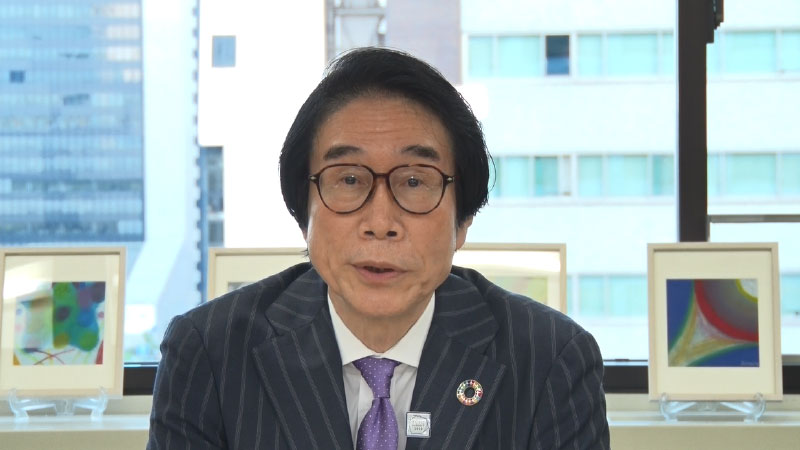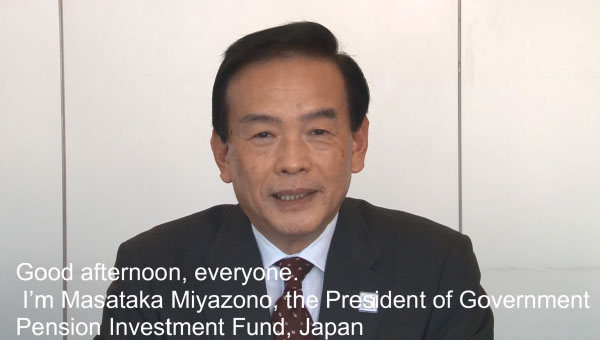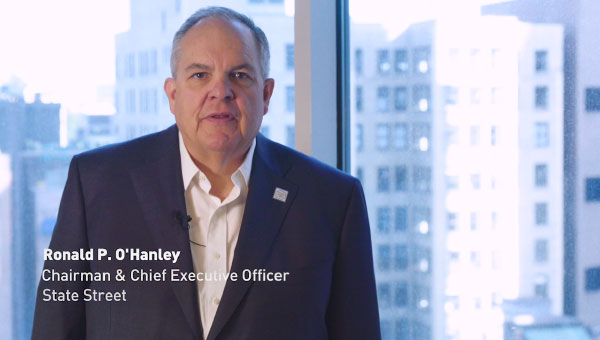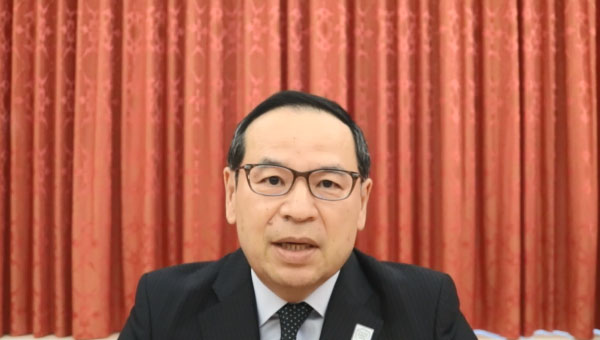On 15 November 2025, METI held a seminar at COP30 Japan Pavilion. Please see below for the Video Distribution of the seminar.
Past
Events
Video Distribution
GGX Finance Summit 2024 concluded on October 15th. You can watch the conference videos below.
The Overview of GGX Finance Summit 2024
- Day & Time: October 15th, 2024 (Tue) 10:00-17:00 (JST)
- Summit Format: Hybrid (On-Site/ On-Line)
- Host: METI (Ministry of Economy, Trade and Industry)
- Co-Hosts: WBCSD/ TCFD Consortium/ The GX Acceleration Agency
Program
Summit Overview
METI held the GGX (Global GX) Finance Summit on Tuesday, October 15 as a part of Tokyo GX Week and Japan Weeks, which started on Sunday, October 6, in order to further discuss transition finance, industry de-carbonization, and other issues; promote cooperation among the government, private, and finance sectors; and be a leader in creating international rules for reducing emissions while achieving economic growth within existing frameworks.
The summit had four sessions: (1) Expanding the GX Market, (2) Creating a GX Startup Ecosystem, (3) Future Prospects of Transition Finance, and (4) Formulating a Transition Plan. Experts from Japan and overseas gave a speech on each theme, and panel discussions were held on the activities necessary to achieve GX.
Session Topics
Opening Remarks
RYUZAKI Takatsugu (Director-General, GX Policy Group, Ministry of Economy, Trade and Industry (METI))
- The key to the GX Promotion Strategy created in the previous year is the growth-oriented carbon pricing concept that achieves compatibility between economic growth and emissions reductions through the introduction of carbon pricing after the issuance of GX economy transition bonds. Of particular need is transition finance to handle the large capital demand for transitions in hard-to-abate sectors.
- In order to achieve GX, an environment needs to be created that generates demand, along with international cooperation, and active discussions on the establishment of global rules and the promotion of transition finance are expected to occur.

KOBORI Hideki (Vice Chair, KEIDANREN (Japan Business Federation))
- KEIDANREN has been actively providing opinions on GX. For example, we provided suggestions to the Japanese government in 2022. In order to achieve the 150 trillion yen in investments by the public and private sectors over 10 years as suggested by the government, it is necessary to create an environment favorable to mobilize private funds by: (1) promoting engagement and a wider range of information disclosure, (2) improving the reliability and efficacy of business transitions through the use of roadmaps and guidance released by the Japanese government, (3) actively evaluating the degree of contribution to emission reductions, and (4) establishing global rules through international cooperation on initiatives such as AZEC.

Mary L. Schapiro (Vice Chair, Glasgow Financial Alliance for Net Zero (GFANZ))
- The de-carbonization of a carbon-intensive economy like Japan and the management of the impact on businesses, workers, and society resulting from the transition is a challenge shared by countries worldwide. However, the progress of technology, the impact of policy, and economic changes arising from the transition are indicators of hope. The finance sector and real-economy businesses are continuing to find growth opportunities amid the transition.
- Businesses should evaluate risks and opportunities related to climate change and the transition based on ISSB or other standards; establish and release a high-quality, reliable transition plan based on GFANZ or other frameworks; and strengthen engagement with investment companies. If financial institutions, real-economy businesses, and policymakers can work together, it should curb global warming and prevent the most catastrophic results.

Session 1: Expanding the GX Market
Panel Discussion 1
- Sectors where emission reductions are difficult account for a large percentage of worldwide emissions, and it is vital to achieve de-carbonization in these sectors, but we are facing financial and technological challenges. In order to promote de-carbonization in industrial sectors, we must create a GX market and demand for products with investments in de-carbonization.
- In order to create demand, we need a suitable way to evaluate the green premium. A METI workshop discussed and created guidelines based on a concept for emission reduction performance that quantifies emission reductions in the manufacturing stage. Using this index as a global standard and increasing awareness of it was proposed as one way to expand the GX market.
- In order to execute de-carbonization projects, it is important to ensure demand. The World Economic Forum clarified demand through the First Movers Coalition, and the WBCSD created the Center for Decarbonization Demand Acceleration in September, which is engaged in promotion activities.
- The creation of a GX market is vital to expand investment in de-carbonization, and cooperation is important between financial institutions and industries and between suppliers and the demand side in order to achieve net zero emissions. In the future, we would like to discuss emission reduction performance, which is still in the concept stage, and contributions to emission reductions as an indicator for evaluating the value of a reduction from the perspective of an incentive basis.
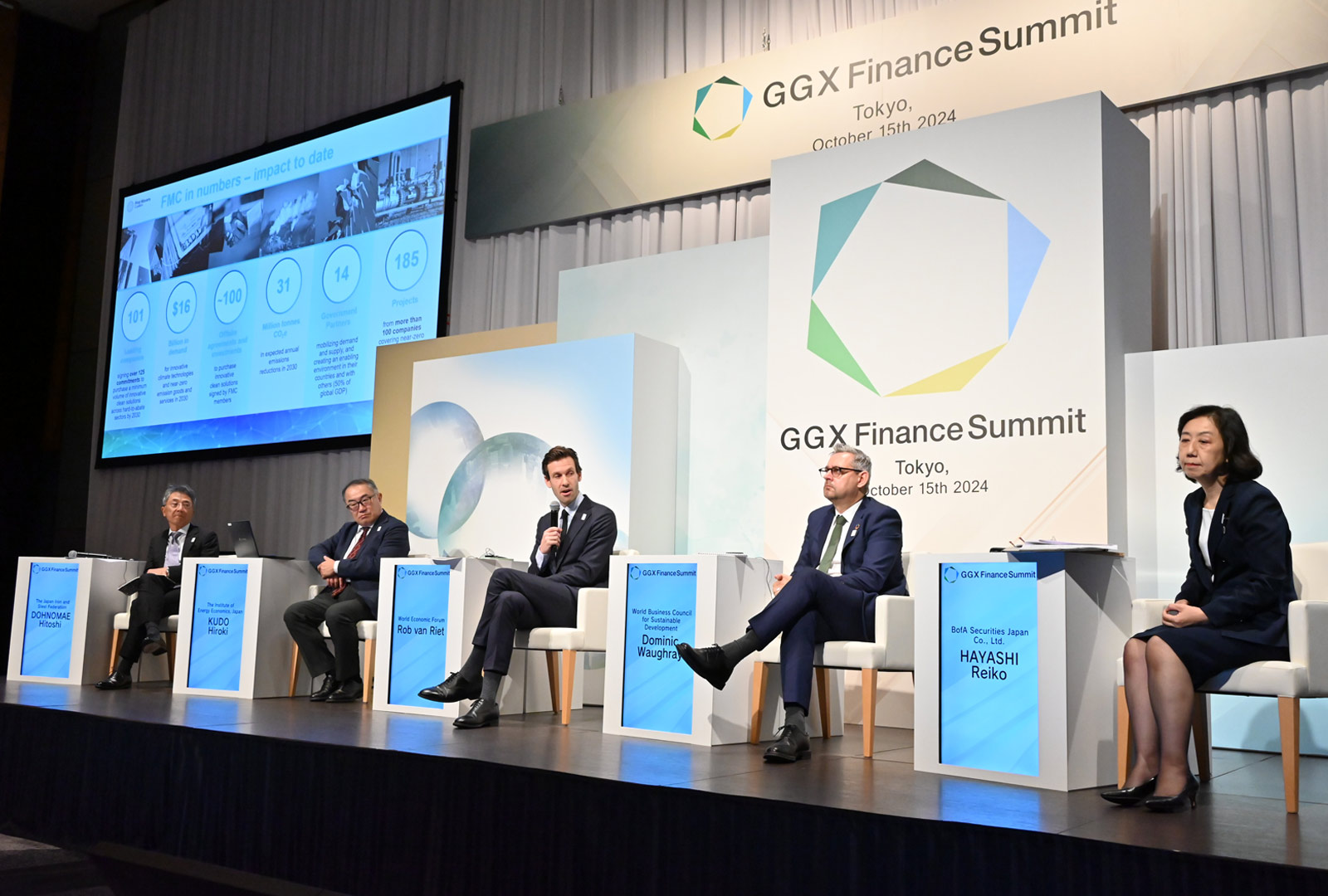
Session 2: Creating a GX Startup Ecosystem
Keynote Speech
KIKUKAWA Jingo (Director-General, Innovation and Environment Policy Bureau, Ministry of Economy, Trade and Industry (METI))
- Japan's startup ecosystem is bringing about major changes as the number of startups and the amount of funding steadily increases. Japan has a stockpile of technology related to the GX field, and GX field startups have the potential to exhibit significant growth, but they have a mountain of challenges such as poor international recognition, the need for large-scale investment, long lead times, high business risks such as a dependence on international policy, and the developing funding environment in Japan. In order to get past this situation, a 300 billion yen budget has been established for deep-tech startups in the GX field to provide comprehensive support covering research and development for technology seeds and scaling-up businesses for mass production and social implementation as well as support for collaborative research with overseas businesses.

Katherine Elizabeth Monahan (Deputy Chief of Mission, Embassy of the United States of America)
- The Japanese GX Promotion Act and the US Inflation Reduction Act are similar in that the government is responsible for handling the overall environment while the private sector is given a lead role. The transition to clean energy is a leadership priority, and Japan and the US are both positioned to be world leaders in this transition through government policy, advanced research, and forward-thinking businesses. Japan and the US have a global partnership to promote a shared vision of future development and prosperity, and we aim to promote innovation, strengthen our industrial foundations, and grow strategic emerging industries.

Panel Discussion2
- GX startups are the drivers of innovative technology that will achieve GX. De-carbonization is largely dependent on the development and commercialization of innovation, meaning support for GX startups is vital.
- GX startups have opportunities for growth owing to their scientific advantages.
- It will take time for the GX field to refine its technology and for businesses to achieve stable profits. Therefore, it is important to support growth for commercialization in addition to R&D through funding of a sufficient scale and flexible time frames.
- The government has the role of ensuring continual demand for de-carbonization technology. However, to ensure that the startup ecosystem can grow healthily, public funding must not distort the market.
- GX startups should aim for global markets instead of being confined in Japan.
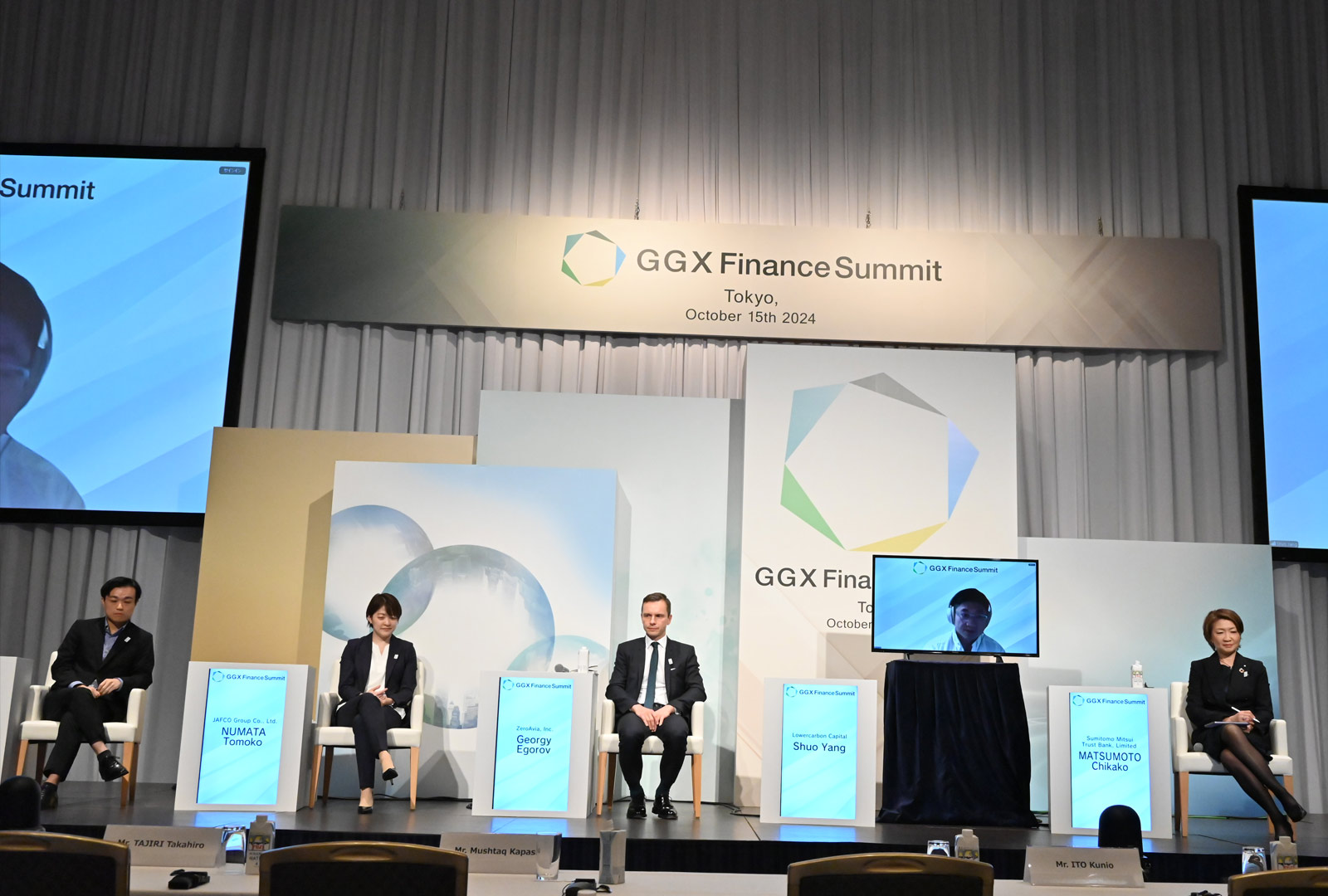
Session 3: Future Prospects of Transition Finance
Keynote Speech
MIYAZONO Masataka (President, Government Pension Investment Fund (GPIF))
- The GPIF discloses climate-related financial information in line with the TCFD declaration based on climate change risk and invests in GX economy transition bonds.
- In 2023, we analyzed the relationship between greenium and third-party certifications, information disclosure, and impact, and we found that there tends to be a greenium if third-party certification is performed and the usage of funds is disclosed.
- In order to achieve GX, it is important for projects with a larger impact to be funded at a lower cost. In terms of continuing discussions on what impacts should be taken into account in the pursuit of profit for stakeholders, we expect to see better information disclosures on the impact of GPIF investments. We hope to see more voluntary ESG information disclosures and businesses raising issues to contribute to the sustainability of the overall market.

FUKUTOME Akihiro (Chairperson, Japanese Bankers Association)
- The GX Promotion Act was established last year, GX economy transition bonds began being issued this February, and activities of the GX Acceleration Agency began this July. GX has reached a stage where it is being implemented in society as a business.
- The banking world is currently working on transition finance projects, but it is most important for members of the supply chain and stakeholders to work together to understand the transition better and promote action.
- We (Sumitomo Mitsui Banking Corporation) recently released the Transition Finance Scorebook, which summarizes challenges and example projects for moving forward with transition finance. We hope it will be useful for transition finance in the future.

Panel Discussion3
- Over the past few years, the world has had a better understanding of the concept and importance of transition finance. Countries and regions around the world have been releasing different tools and guidance.
- Japan's Climate Transition Bond was positively received, and it has helped increase awareness of transition finance. However, for individual projects, the definition and target are still subject to debate.
- Transition plans have three levels: business, sector, and country (government). The reliability of a transition plan increases when the government is committed to supporting the transition of businesses and industries.
- An important role of the government in spreading transition finance is encouraging the transition throughout the economy through budgetary measures for sectors that need support and taking the reins in improving education and awareness in markets and with investors.
- It is important to increase the overall reliability of transition finance, and disclosures and reporting are necessary. If transition finance can contribute to long-term emission reductions, it can be seen as reliable.
- Many frameworks related to transition finance and frameworks for the reliability of pathway judgments in many cases have the 1.5℃ target as a prerequisite, but this is difficult for emerging nations. It is important to discuss ways to close the gap and how reliable tools can be used for this purpose.
- Japan established the Asia GX Consortium for activities in the Asian financial market based on the concept of transition. We will provide real examples and use existing resources to create and implement a reliable transition finance framework in the context of emerging nations.
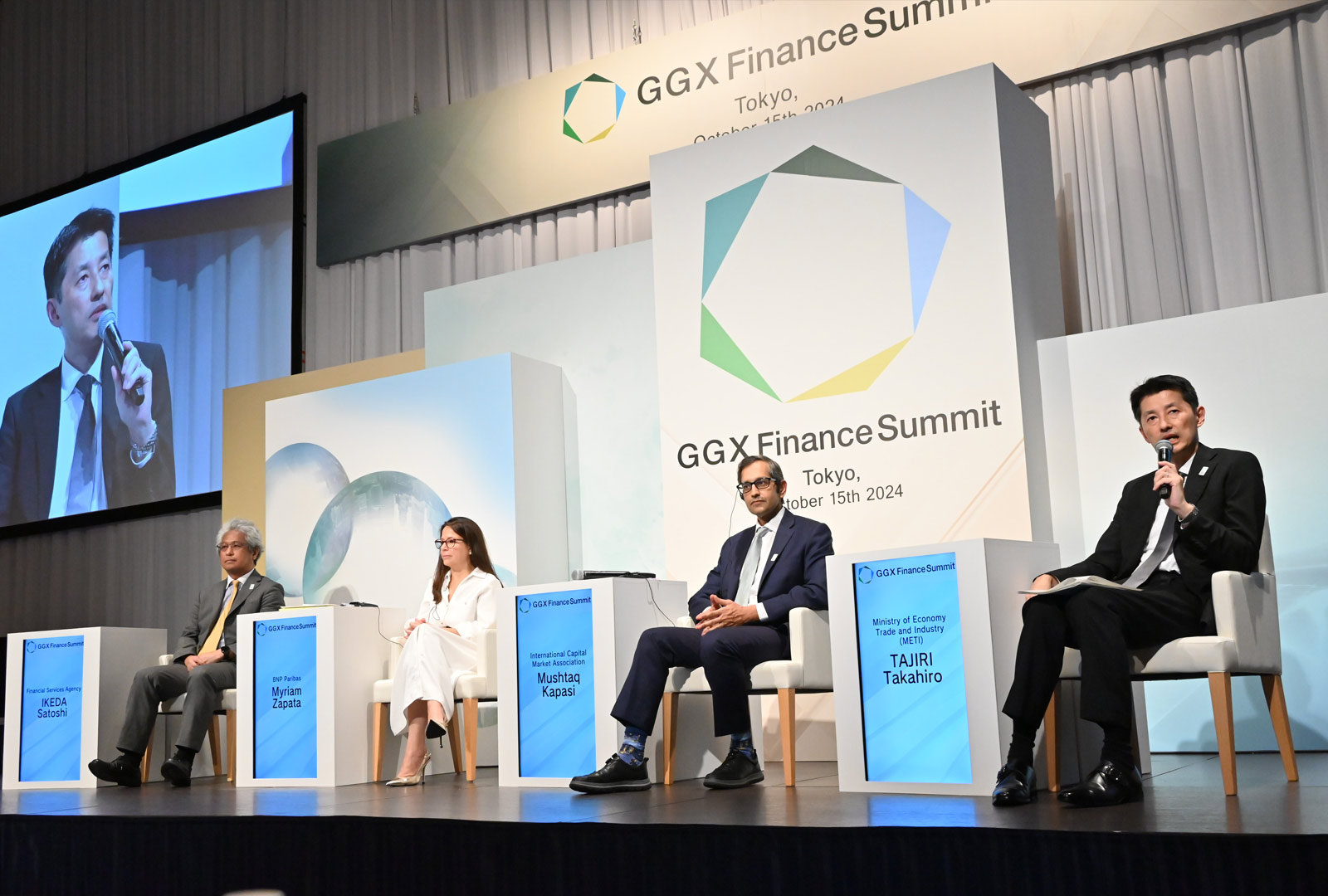
Session 4: Formulating Transition Plan
Keynote Speech
ITO Kunio (Chair of the TCFD Consortium)
- TCFD and the TCFD Consortium are reaching a major turning point as TCFD activities wind down, but we see greater importance in climate-related disclosures for achieving GX targets.
- The TCFD Consortium created and revised TCFD guidance and green investment guidance. In August this year, we released a transition plan guidebook, and we are continuing discussions related to climate-related disclosures from Japanese businesses participating in TCFD. We will be involved in the operation of the GX Acceleration Agency in the future, and we will continue to discuss activities related to finance.

Panel Discussion4
- The systemization and standardization of climate-related disclosures is progressing, and the number of businesses engaging in disclosure activities is quickly increasing. Internal and external discussions on the ideal form of a company through information disclosures are effective for advancing activities for de-carbonization.
- Businesses must create and share transition strategies that balance business growth and profit creation with sustainability in order to satisfy stakeholders.
- Businesses must work together to achieve the transition across society. When transition plans with ambitious targets are released, it can lead to hints toward a solution from outside of the company.
- Investors can increase their understanding of business activities regarding climate change from the transition plan. Two-way communications with businesses improve disclosures and lead to de-carbonization activities.
- National transition plans are needed. Japan's government GX policy could become the international standard.
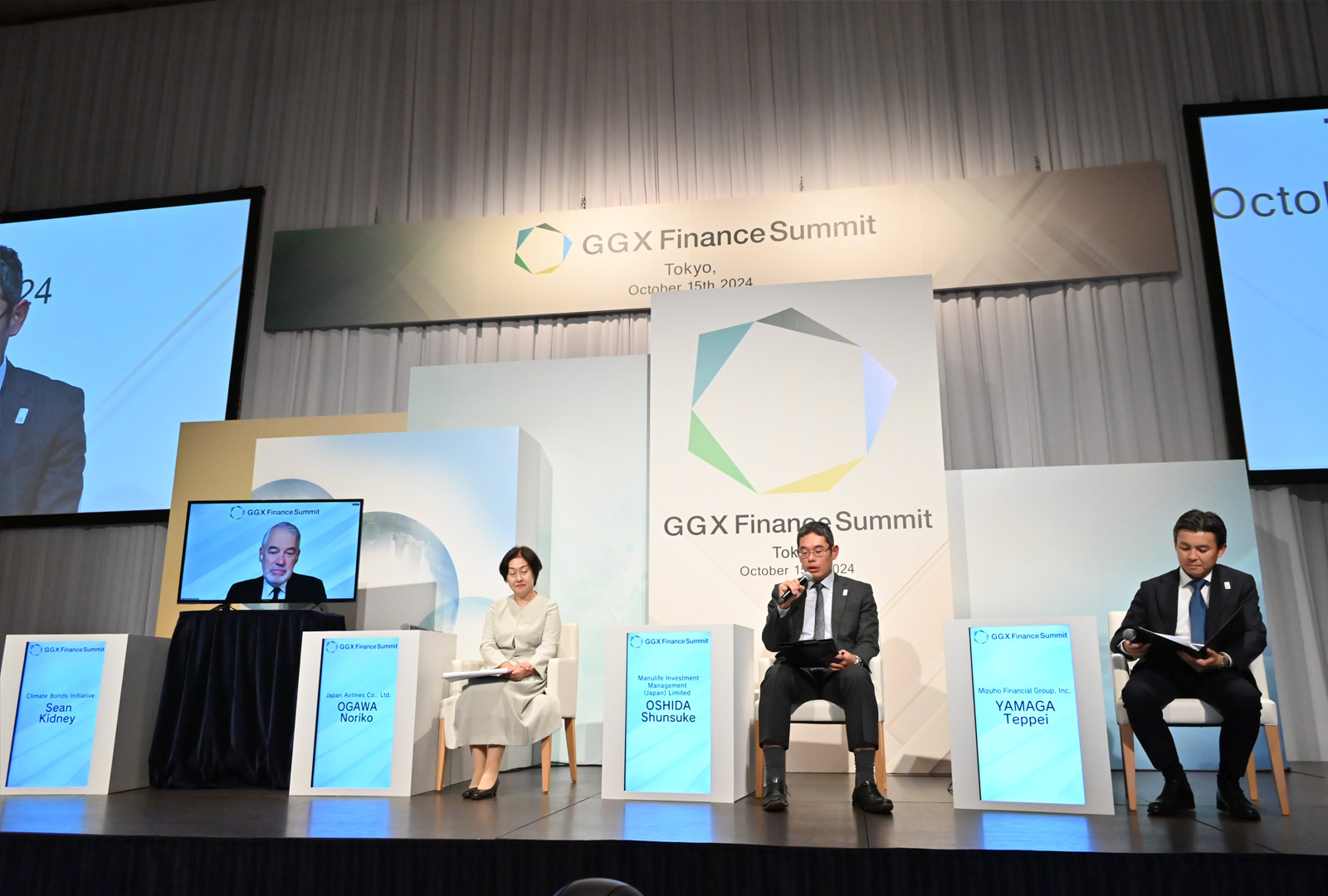
Closing Remarks
SHIGETAKE Naoki (COO, GX Acceleration Agency)
- The core message of this summit was the idea of a phase shift in GX.
- Session 1 covered the need to focus on the demand side of GX and the importance of reduction in visualizing product emission reductions. Session 2 indicated that startups have a large potential for innovations in the GX field. Session 3 covered the idea that there are various ways to reach a single target and that it is necessary to achieve transition finance through regulation. Session 4 indicated steady progress in activities for transition plans and that transition plans are a strategy for driving investment decisions and are vital for achieving GX.
- Accordingly, this summit is a clear indicator that the new GGX generation has started, and the GX Acceleration Agency will put its best efforts into accelerating a green transformation.

On 3-5 December, METI held a seminar at COP28 (Dubai, UAE) Japan Pavilion.
Please see below for the Video Distribution of the seminar.
1. Appropriate evaluation of avoided emissions towards net zero society
Video Distribution
2. The Role of Sovereign Bonds in Expanding GX Finance
Video Distribution
3. Tech for Transition
Video Distribution
For further details of COP28 Japan Pavilion, please refer to the website below.
hhttp://copjapan.env.go.jp/cop/cop28/en/
Video Distribution
Overview of the GGX×TCFD Summit
- Date: October 2nd, 2023
- Format: Hybrid (On-Site and On-Line)
- Organizer: Ministry of Economy, Trade and Industry (METI)
- Co-organizers: The World Business Council for Sustainable Development (WBCSD) and the TCFD Consortium
Program
Outline of the event
METI held the GGX Finance Summit 2024 on Monday, October 2, 2023, as part of the Tokyo GX Week and Japan Weeks that started from September 25, 2023. The conference integrates two events: the Global GX Conference (GGX), which discusses the realization of GX around the world, and the TCFD Summit, which brings together the leaders of global companies, financial institutions, and other organizations that play leading roles in addressing the Task Force on Climate-related Financial Disclosures (TCFD) recommendations.
The GGX Finance Summit 2024 comprised four sessions: (1) "Towards a Net-zero Society--Industrial Decarbonization," (2) "Solution Providers and Avoided Emissions," (3) "The Future of Climate-Related Financial Disclosures," and (4) "Further Promotion of Transition Finance. " In each session, experts from Japan and abroad made proposals on each subject, while in the panel discussions participants examined future efforts expected to become necessary for the realization of GX.
Details of the discussions
Opening Remarks
HATAKEYAMA Yojiro (Director-General, Industrial Science, Technology and Environment Policy Bureau, Ministry of Economy, Trade and Industry)
The Japanese Government formulated the GX Promotion Strategy to simultaneously achieve the three goals of decarbonization, stable energy supply, and economic growth. The "Pro-Growth Carbon Pricing Concept," which combines upfront investment and carbon pricing, is the pillar of the GX policy, and the GX Econoy Transition Bonds to support GX investment amounting to JPY 20 trillion will be issued over the next ten years.
This year, the Global GX Conference and the TCFD Summit were integrated to form the GGX × TCFD Summit, focusing on the decarbonization of the industry, the financing required to achieve it, and the disclosure of information to support this process. It is hoped that this summit will further deepen the discussion on the realization of GX.

TOKURA Masakazu (Chairman, KEIDANREN (Japan Business Federation))
The Japanese Government’s GX policy is welcomed. To facilitate a combined public-private investment of JPY 150 trillion over the next ten years, there is a pressing need to establish an environment conducive to mobilizing private capital. There is a demand for the provision of long-term support for companies engaged in bringing about innovations in zero-emission technologies that do not currently exist. Expectations are also placed on the proactive assessment of "avoided emissions" for the diffusion of technologies, products, and services that contribute to emission reduction.
To transform industries on an unprecedented scale, it is essential to support initiatives through cooperation between the public sector, businesses, and financial sector.

KATO Masahiko (Chairperson, Japanese Bankers Association)
One of the primary roles of financial institutions is to use the information disclosed by companies to facilitate the provision of the funds necessary for the transition to the real economy and accelerate the efforts of companies.
Meanwhile, there is growing demand for the banking industry to reduce CO2 emissions through investment and financing. In marking the 150th anniversary of banking in Japan, the financial sector and Government of Japan will continue to work together to promote GX and achieve a decarbonized society through enhanced engagement, disclosure support for companies, and the expansion of sustainable finance.

David Atkin (CEO, Principles for Responsible Investment (PRI))
Since its founding in 2006, the Principles for Responsible Investment (PRI) has established six Principles to support the creation of a sustainable global financial system. Today, some 5,500 institutions representing over USD 120 trillion in assets under management have signed on.
As global agreements have been reached to address climate change and biodiversity, expectations for responsible investment have increased. Given the fact that the PRI in Person conference sold out, and the success of this conference, it is evident that momentum for sustainable finance is growing in Tokyo.

Session 1
Keynote Speech 1
Gianluigi Benedetti (Ambassador, Embassy of Italy in Tokyo)
The industrial sector is expected to play a leading role in the transition to a climate-neutral economy. A critical aspect of industrial decarbonization is maintaining a competitive industry and preventing carbon leakage. In this context, the G7 Industrial Decarbonization Agenda initiative, which Japan has also focused on, provides a strategic framework for the decarbonization of heavy industry and the development of innovative technologies, and Italy would like to follow this meaningful activity. Notably, 64% of Italy’s industrial emissions come from the hard-to-abate sector, representing 5% of the gross domestic product and 700,000 jobs. The Italian Government is allocating 31.5% of the National Recovery and Resilience Plan funds-EUR 59.47 billion-to decarbonization efforts, but even so, these solutions are not well suited to all production conditions. Therefore, it is imperative to develop an integrated decarbonization strategy that does not exclude all options. Building on the work undertaken under the Japanese Presidency in the run-up to the next year’s G7 in Italy, we will work ambitiously toward this common goal.

Panel Discussion 1
Towards Net-Zero Society -Industrial Decarbonisation-Given that 30% of global CO2 emissions come from hard-to-abate sectors such as steel and chemicals, the need and challenges of stimulating green market demand to decarbonize these sectors were discussed. It was highlighted that initiatives to encourage private procurement through the First Movers Coalition (FMC) and public procurement through the Industrial Deep Decarbonisation Initiative (IDDI) would be key drivers in stimulating green market demand, attracting the necessary investment in hard-to-abate sectors, and leading to the commercialization of advanced decarbonization technologies. The challenge raised was that in order to encourage consumers to purchase green products, it is necessary for the environmental value to be visible and adequately assessed, and for the business environment to be such that consumers are willing to accept the increased costs.
This was followed by a discussion on data-based industrial decarbonization to create green markets. It was noted that it is vital to advance the discussion on the definition of near-zero emission materials, which requires the collection, assessment, and harmonization of appropriate data across different national emission measurement methodologies. The fact was presented that the steel sector had agreed to initiate a "Global Data Collection Framework" as part of the G7 Industrial Decarbonisation Agenda. It was also suggested that a mass balance approach to achieving steady emission reductions across the enterprise would be beneficial in creating an initial market for near-zero emission materials, and that sharing the concept between upstream and downstream industries would result in the steady decarbonization of the entire supply chain.
Finally, it was emphasized that industrial decarbonization in the run-up to COP28 requires accelerated action by all stakeholders, including developing countries, to drive industrial transitions across value chains and key sectors, including participation in international initiatives, and that the public and private sectors must work together to address these issues.

Session 2
Panel Discussion
Solution Provider and Avoided EmissionsAs society’s expectations of companies’ contribution to the achievement of the SDGs increase, there is a need to create value by contributing to the solving of societal problems through corporate activities, that is, "solution-providing capabilities." In the context of climate change, greenhouse gas emissions are perceived as a risk factor that affects companies’ competitive positions, leading to the development of Scope 1 to 3 assessment methodologies. However, this alone is not sufficient to assess companies, and there is a need for additional mechanisms to assess a company’s contribution to reducing emissions in society as a whole and encourage positive climate behavior. One expected outcome is "avoided emissions" as an indicator of a company’s "solution-providing capability." From the perspective of financial institutions, they also want to look at the "growth opportunities" of companies rather than focusing solely on the "risk" aspect of reducing the company’s emissions, as they can allocate capital most efficiently by pursuing the contribution of reductions to society as a whole through innovation; furthermore, it was noted that a more holistic approach could be used to evaluate companies that contribute to decarbonization. However, it was also pointed out that to avoid greenwashing, avoided emissions should be clearly distinguished from Scope 1 to 3 emissions and, therefore, cannot be used as a means of offsetting.
It was stressed that it is important to facilitate discussions with various stakeholders on the disclosure and analysis of avoided emission data for preventing greenwashing. At the global level, the International Electrotechnical Commission is standardizing measurement methodologies for avoided emissions in the electrical and electronics sector, with the aim of publication by the end of 2024. Regarding the World Business Council for Sustainable Development, sector-specific case studies are being conducted based on the guidance issued in March this year to make it more relevant to the realities of the sector. Case studies on the use of avoided emissions by financial institutions are also being conducted by the GX League in Japan. For avoided emissions to be adopted as one of the criteria for evaluating companies in financial institutions, expectations were voiced for the standardization of measurement methodologies within the same industry, as in the electrical and electronics sector, and the expansion of similar initiatives to other comparable industries so that data could be compared across industries.
To further popularize the concept of avoided emissions in society, it was concluded that it is important to first establish a forum for discussion on avoided emissions among stakeholders and stimulate communication.

Session 3
Keynote Speech 3
Emmanuel Faber
Chair, International Sustainability Standards Board (ISSB)
In June, the International Sustainability Standards Board (ISSB) published two IFRS Sustainability Disclosure Standards: IFRS S1 General Requirements for Disclosure of Sustainability-related Financial Information and IFRS S2 Climate-related Disclosure. Both standards were developed based on the recommendations of the Task Force on Climate-related Financial Disclosures (TCFD).
The Financial Stability Board, which established the TCFD, praised the standards, stating that the TCFD’s efforts have borne fruit in S1 and S2. While the adoption of the standards is at the discretion of each country, the ISSB is deeply grateful to the Sustainability Standards Board of Japan for considering national standards based on the IFRS standards ahead of other countries.

MIYAZONO Masataka (President, Government Pension Investment Fund)
The approximately JPY 220 trillion in pension reserves under management by the Government Pension Investment Fund (GPIF) is a source of funding for future pension benefits. Our mission is to stably increase the number of assets, but climate change risk coincides across all assets and is difficult to avoid through diversified investments; hence, the GPIF has positioned climate change as a top priority subject and expressed its endorsement of the TCFD recommendations in 2018. Proper disclosures are a critical element in assessing a company’s competitiveness. Appropriately valuing companies’ efforts to reduce emissions and encouraging investment in those companies will lead to decarbonization.

MIZUNO Hiromichi (Founder and CEO, Good Steward Partners, LLC)
In its eight years of existence, the TCFD has promoted the disclosure of information on climate change. However, this will soon come to an end. From here onwards, it will become important how the disclosed information is processed into a form that is easy for investors to use and how it is used in financial analysis and decision-making.
Although the anti-ESG movement is gaining momentum in the U.S., this is a political issue. If you ask the financial community, "Does climate risk affect investment performance?", most would reply, "Yes."
Japan is the most significant contributor to the TCFD initiatives. Expectations for future initiatives by Japanese companies are high.

Panel Discussion 3
Future of Climate-Related Financial DisclosuresIn light of the publication of the International Sustainability Standards Board (ISSB) disclosure standards this summer and the expectation for further promotion of climate change-related information disclosure, discussions were held on the nature of disclosure sought by companies and financial institutions in promoting transition finance.
For transition finance to become more widespread, credible transition plans must be formulated and disclosed. Tools such as the guidelines developed by the Glasgow Financial Alliance for Net Zero (GFANZ) are in place, and there is currently a growing number of companies disclosing in line with these guidelines. Expectations for future development were also expressed.
Financial institutions recognized the challenge of disclosing emissions on their portfolios. It was also recognized that financed emissions only represent a snapshot of the emissions in a financial institution’s portfolio at one point in time, and thus have the limitation that future reduction paths are not apparent. In this context, the paper released on the same day by the Japan Public and Private Working Group on Financed Emissions to Promote Transition Finance was welcomed.

Session 4
Keynote Speech 4
Mary Schapiro (Head, The TCFD Secretariat)
A shared global climate information disclosure standard has been established by the ISSB. The GFANZ published its transition planning framework last year.
There is a strong need to promote the achievement of decarbonization targets through consistent disclosure, including that of transition plans, to finance technologies and products that enable the decarbonization of the economy, companies aligned which have net-zero business models, companies with credible transition plans, and the managed phaseout of high-emitting assets that risk being stranded in a net-zero economy.

ITO Kunio (Chair, The TCFD Consortium)
Of the more than 4,700 organizations worldwide which have endorsed the TCFD recommendations, 1,454 are from Japan. Although disclosure standards will be transferred from the TCFD to the ISSB in the near future, the TCFD Consortium remains a valuable forum for those who disclose information and those who utilize it to collaborate and discuss global developments.
The significance of transition finance was recognized at the G7 Hiroshima Summit in May. Following this, it is hoped that companies will further enhance their disclosures, and that financial institutions will value them, leading to an abundant supply of finance to combat climate change.

Panel Discussion 4
Further Promotion of Transition FinanceAlthough transition finance has first been perceived as greenwashing due to some of its initial projects, it is necessary globally, and understanding of it in Europe is progressing. To promote transition finance, the roadmap developed by Japan and the transition strategy described in the Climate Transition Finance Handbook published by the International Capital Market Association are of great importance. Various tools are becoming available, and opportunities are emerging to discuss in earnest the promotion of transition finance. To further facilitate transition finance, it was acknowledged that it is necessary to acknowledge that various modalities have their own strengths and weaknesses, such as taxonomies not being compatible with innovative technologies of which its timing of implementation is difficult to predict, and that the environment needs to be further improved.
While there are various types of financial instruments, such as green bonds and transition bonds, it was recognized that they all focus on different aspects of the same goal of combating climate change, and expectations for the rapid expansion of the transition bond market were expressed.
Setting out the example that ammonia combustion technology is expected to contribute significantly to the transition, the view was shared that research and development should be driven on all avenues toward decarbonization. It was expressed that Europe’s InvestEU, the U.S. Inflation Reduction Act, and Japan’s GX policy are innovative initiatives and will be a long-term trend. It was also recognized that the development and implementation of new technologies, which are an integral part of GX, require continued dialogue between financial institutions and companies as well as disclosure to ensure credibility.

Closing Remarks
Peter Bakker (President and CEO, World Business Council for Sustainable Development (WBCSD))
The discussions at the 2019 TCFD Summit were conceptual. The word "decarbonization" was not used, but rather, it was described as a "virtuous cycle of environment and growth." This time, however, all speakers spoke of the need to move toward decarbonization, reduce greenhouse gas emissions by 50% by 2030, and achieve carbon neutrality by 2050. Transition as a climate change measure is no longer a concept as it was in 2019, but rather an action plan. Financial resources are necessary to put it into action. Therefore, the progress of the transitions must be evaluated and the results disclosed. Investors can then assess the results and redirect funds toward promising solutions. Therefore, creating a virtuous cycle is fundamental. It is of great significance that this year’s discussion combined corporate transitions and accountability.

Conference Outline
Click here to download the Conference Outline and Program.
Video Distribution
Outcome
(i) Summary of Discussion
| 1. | The First Global Green Transformation Conference (GGX) was held in a hybrid format on October 7th. A total of more than 1,300 people attended the GGX online and in person. Speakers/panelists attended from five G7 countries, two international organizations, twelve universities, research institutes, and private companies, including video messages from ministers and heads of organizations. |
|---|---|
| 2. | Green Transformation (GX) is to shift the economic, social, and industrial structure to be driven by clean energy, and achieve both economic growth and emissions mitigation. GGX was the first time in the world to discuss the way forward of realizing global Green Transformation. |
| 3. | GGX featured (1) speeches by high-level participants from countries and organizations, (2) "FMC in Japan" (*see reference below), the first high-level ceremony in Asia of the First Movers Coalition (FMC), which is an initiative in which global companies commit themselves to procure a certain amount of green products to create initial demand. Three thematic panel discussions on "Designing a Green Market", "Standards and Evaluations Promoting Green Products/Services" and "International Cooperation for Developing a Green Society" were held afterwards to discuss prospects and challenges for the realization of GX. Throughout the meeting, many references and expectations were made by the participants, including those at the high-level, on need for action of advancing the efforts toward GX. |
| 4. | In the opening session, a total of seven high-level speeches were given in this session. Mr. Shinichi Nakatani, State Minister of Economy, Trade and Industry, Japan, made opening remarks about Japan’s action towards GX and highlighted the concept of "Mitigation Contribution". Mr. Peter Bakker, President and CEO of the WBCSD, pointed out that it is essential to establish evaluation methods for corporate initiatives and to make a structural shift from profit-seeking to decarbonization. Mr. John Kerry, Special Presidential Envoy for Climate, United States, pointed out the importance of sectoral initiatives and the First Movers Coalition for market creation. Mr. Frans Timmermans, Executive Vice-President of the European Commission, introduced EU’s action towards working on regulatory measures, including the Emissions Trading System and Carbon Boarder Adjustment Mechanism, and expressed interest in Japan’s work on voluntary measures such as GX League. The Rt Hon. Lord Callanan, Parliamentary Under Secretary of State (Minister for Business, Energy and Corporate Responsibility), United Kingdom of Great Britain and Northern Ireland, introduced UK’s action towards climate and emphasized the significance of the Breakthrough Agenda to promote the distribution of clean technology. Mr. Mathias Cormann, Secretary-General of the OECD, commented the actions of OECD towards climate, emphasizing the importance of IFCMA. Dr. Fatih Birol, Executive Director of the IEA, mentioned the importance of industrial decarbonization and the progress of discussions on the definition of near-zero emission materials, and disclosure of data. |
| 5. | In the "FMC in Japan", a photo session was first held. Mr. Shinichi Nakatani, the State Minister of Economy, Trade and Industry, introduced Japan’s participation in the FMC as a Strategic Government Partner country in May 2022 that this is the first FMC related high-level ceremony to be held in Asia. Ms. Nancy Gillis of The World Economic Forum, who co-chairs the First Movers Coalition (FMC) with the United States, introduced the FMC, an initiative for global companies to set procurement targets for green products which will create initial demand signal. Mr. Philip Roskamp, Acting Deputy Chief of Mission of the U.S. Embassy in Japan, stated that he expected many Japanese companies to participate in the FMC Finally, Mr. Toshiaki Tanaka, Vice President of Mitsui O.S.K Lines, Ltd., the first Japanese company to participate in FMC, expressed the company’s strong commitment to emission reduction as a shipping company which is essential part of the social infrastructure, and the importance of international forums for sharing best practices, such as the FMC. |
| 6. | In the Panel Discussion on "Designing a Green Market", panelists made presentations on various actions to reduce emissions levels on both the supply side and the demand side. From the supply side, carbon pricing was raised as one essential measure to reduce GHG emissions, which also has the aspect to mobilize the revenue necessary for innovation. From the demand side, public and private initiative to commit to purchasing green products was raised as an example. Furthermore, panelists noted the importance of deploying innovative technologies through subsidies as well as deploying low-carbon technologies through transition finance as a financing approach that will preserve industrial competitiveness. The discussions also extended to issues such as the need to address just transition, the importance of meeting the sense of urgency in decarbonization, the importance of building supply chains for decarbonized products, and the need for investments in infrastructure that underpin a decarbonized economy. |
| 7. | In the Panel Discussion of "Standards and Evaluations Promoting Green Products/Services", the keynote speech suggested that while the mainstream frameworks today focus on "how to reduce GHG emissions from a certain entity (e.g. a country, a company) throughout their supply chains", the perspective of evaluating" how much a certain entity contributes to mitigation throughout the society in total” is important as well. Panelists generally agreed on the significant potential of the concept of "Mitigation Contribution" as well as the importance of involving the financial sector, and to recognize such contribution as a value. At the same time, panelists also agreed that discussion is necessary in setting the baseline of emission, in defining a methodology of the mitigation contribution, the importance of preventing this concept to be misunderstood as "greenwashing", and that a clear understanding of differentiating the concept from the GHG protocol (scope1-3) or NDC is needed. The session concluded with the expectation of enhanced discussion in the private sector, notably including the financial stakeholders and expectation towards the public sector to support such concept and discuss in international fora, such as the G7. |
| 8. | In the Panel Discussion on "International Cooperation for Developing a Green Society", panelists introduced recent developments in discussions on policy measures (e.g., carbon border adjustment measures) to build the foundations of a green society, and preventing carbon leakage and maintaining the international competitiveness of domestic industry. Discussions covered the impacts and challenges of carbon pricing based and emission intensity based approaches. Panelists expressed the need to understand country specific circumstances and collaborate internationally, including the major emitting countries such as the G20 countries to globally promote green transformation. Panelists emphasized the important role of business in international cooperation and adaptation business was raised as an example. Considering the different marginal abatement costs of countries, Joint Crediting Mechanism (JCM) was also mentioned as enabling frameworks for developed-developing country cooperation. |
| 9. | During the closing session, Mr. Hirohide Hirai, Vice-Minister for International Affairs, Ministry of Economy, Trade and Industry (METI), Japan, summarized the discussions and thanked the participants for their cooperation during the two-week long GX Week and the GGX. |
(ii) Way Forward
| 10. | Based on the discussions at the conference, METI, Japan, will accelerate the discussion on the following points.
|
|---|---|
| 11. | Looking towards COP27 at Egypt, and the G7 meeting in 2023, which Japan will be hosting as presidency, Japan will continue to enhance international cooperation, and engage with developed countries, developing countries, major emitting countries, as well as other stakeholders such as the business sector to pave the way towards realizing GX. (Reference)Photo Session of the FMC in Japan 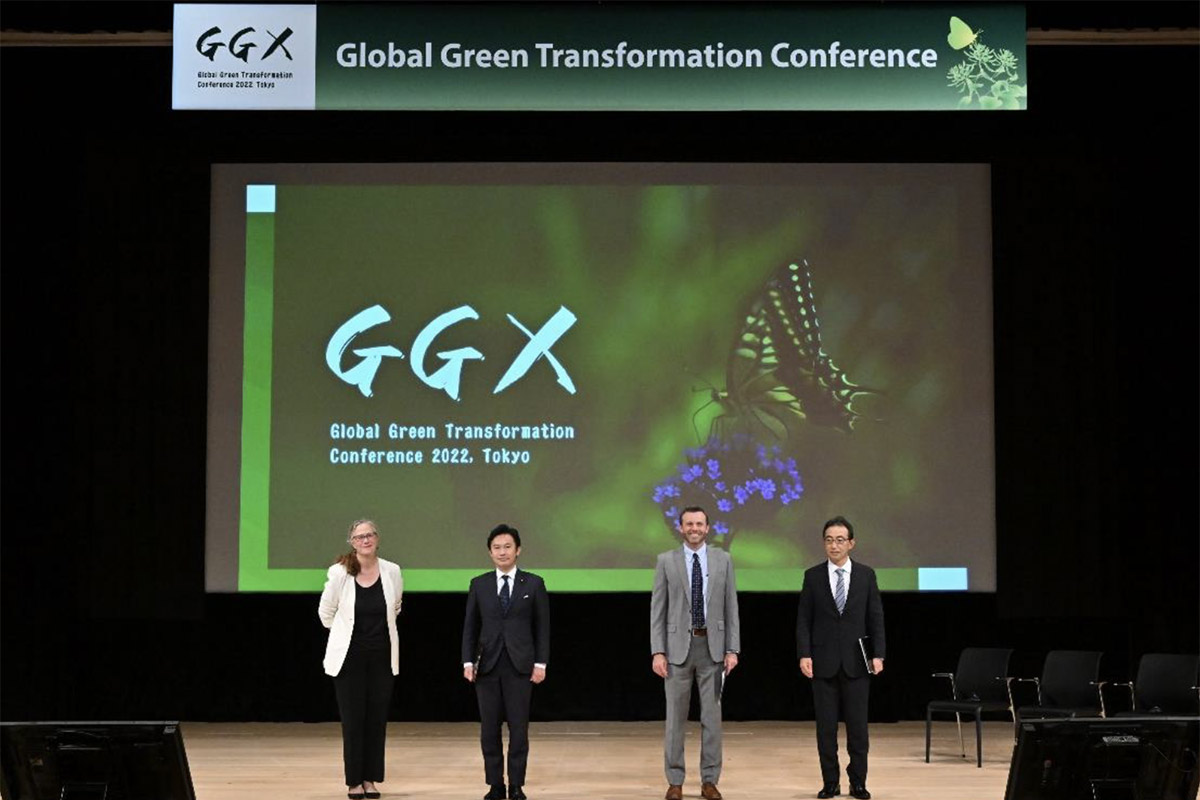 (From left: Ms. Gillis (WEF), Mr. Nakatani (METI), Mr. Roskamp (U.S. Embassy in Japan), Mr. Tanaka (Mitsui O.S.K Lines, Ltd.) |
Video Distribution
Orignal Audio
Background to the TCFD Summit
As financial institutions become increasingly important in pushing for stronger climate change countermeasures, there is a growing international tendency to make it compulsory for companies to disclose climate-related financial information. This is the goal of the Task Force on Climate-related Financial Disclosures (TCFD), a framework for such disclosures. The TCFD is internationally supported as a framework for disclosure. As of September 22, 2022, the number of TCFD endorsers had grown to 3,819 organizations worldwide (an increase of 1,290 since September 30, 2021), with 1,062 of these in Japan (an increase of 553).
In order to achieve a virtuous cycle of economic growth and environmental protection, it is important to disclose information in a manner that will ensure that investors can properly appraise corporate efforts to improve the quality of disclosures based on shared international rules and transition and innovation efforts-an important part of achieving carbon neutrality-and that said disclosures will encourage financing.
The 2022 event was the fourth TCFD Summit. Leaders from the industrial and financial sectors discussed how to promote further use of the TCFD recommendations in order to encourage the expansion of disclosures that will provide a sound basis for appropriate investment decisions. Specifically, the following views were shared by way of key results:
In order to achieve GX, it is important to accelerate transitions using a wide range of technologies and energy sources, and to promote the creation of new innovations and to implement them publicly.
We need to encourage identifying and disclosing opportunities as well as risks. This is very important for the shift to decarbonization.
It is desirable for financial institutions to evaluate companies' initiatives and strategies from a medium- to long-term perspective, and for firms to strengthen information disclosures that can withstand such engagement.
In order to expand the autonomous provision of funds in the private sector for transition finance, it is important to improve the reliability of transition pathways envisioned by firms.
In addition to the disclosure of corporate information on new technologies and their development trends, it is also important for the government to support and engage in financing
Showcase of the TCFD Guidance 3.0
2. Overview of the TCFD Summit 2022
Date: October 5, 2022 (Wed.), 13:00 to 17:45
Format: Online
Organizer: METI
Co-organizers: The World Business Council for Sustainable Development (WBCSD) and the TCFD Consortium
Number of registered viewers: About 2,600
Program: As shown in Attachment 1
Summary of discussions: As shown in Appendix 2
3. Details of the discussions
Welcome message by Mr. Nishimura Yasutoshi, Minister of Economy, Trade and Industry
With the aim of achieving carbon neutrality by 2050 and GX (Green Transformation), it is important to accelerate transitions using a wide range of technologies and energy sources, and to promote the creation of new innovations and to socially implement them while taking into account various real-life conditions. The Japanese government will call for investment capital using information on climate change efforts disclosed by companies based on the TCFD.
Overview of the TCFD Summit 2022
Date: October 5, 2022 (Wed.), 13:00 to 17:45
Format: Online
Organizer: METI
Co-organizers: The World Business Council for Sustainable Development (WBCSD) and the TCFD Consortium
Number of registered viewers: About 2,600
Program: As shown in Attachment 1
Summary of discussions: As shown in Appendix 2
Details of the discussions
Welcome Message
Message from Mr. Nishimura Yasutoshi, Minister of Economy, Trade and Industry
With the aim of achieving carbon neutrality by 2050 and GX (Green Transformation), it is important to accelerate transitions using a wide range of technologies and energy sources, and to promote the creation of new innovations and to socially implement them while taking into account various real-life conditions. The Japanese government will call for investment capital using information on climate change efforts disclosed by companies based on the TCFD.

Opening Remarks
Message from Valdis Dombrovskis (Executive Vice-President, European Commission)
Russia’s illegal invasion of Ukraine has added urgency to green Europe, and the EU has launched the REPowerEU plan to further accelerate climate change measures. Additionally, the EU uses TCFD recommendations as an important reference and promotes measures focusing on information disclosure and sustainability reports in order to attract sufficient private investment. The EU will continue to make efforts to reach climate neutrality and employ every means available to get out of the dependence on energy sources with large amounts of carbon emissions.

Message from Mark Carney (UN Special Envoy on Climate Action and Finance, Co-chair for the Glasgow Financial Alliance for Net Zero)
Japanese companies adopting and implementing TCFD disclosures account for 30 percent of all TCFD-supporting companies around the world. They serve as a role model who plays a leading role in measures against climate change while other companies, countries, and regions follow suit. Since transition from voluntary recommendations to mandatory disclosure standards is essential for reforming the entire financial system toward zero-carbon emissions, ISSB’s efforts to develop universal disclosure standards based on TCFD recommendations should be welcomed. Ahead of COP 27, I hope that the TCFD will remain influential and that Japan will continue to take a lead in this field with unwavering ambition, leadership, and commitment.

Message from Mary L. Schapiro (Head of the TCFD Secretariat)
We are at a turning point where we are shifting from voluntary frameworks to mandatory disclosure standards. We use the TCFD to develop an environment where various countries can adopt the TCFD in a wide variety of ways in order to create thresholds for global climate change disclosure. Through appropriate rule making, we need to continue to help companies provide information that is necessary for investors and markets to manage climate change risks and opportunities.

Message from Ronald P. O’Hanley (Chairman and Chief Executive Officer, State Street Corporation)
In Japan, the improved quality of disclosure due to de-facto mandatory TCFD disclosures and transition roadmaps have enabled financing that uses these frameworks. However, climate change is the most serious investment risk investors are facing for now, and industries with large emissions need funds to reduce their emissions. For that, selling shares is not a solution, and the TCFD is an important tool to enable effective investments in this transition period.

Message from ITO Kunio (Chair of the TCFD Consortium, Director of Hitotsubashi CFO Education and Research Center)
Approximately 70 percent of TCFD Consortium members are business companies, and it is becoming a norm for business companies to actively promote climate-change measures voluntarily and disclose information. Based on descriptions of TCFD disclosures, achievements of the TCFD Consortium, latest knowledge, etc., we have revised the TCFD Guidance. As the organization that has been joined by the world’s largest number of TCFD-supporting organizations, the TCFD Consortium will work together with people around the world and further support the disclosure and utilization of climate-related information going forward.

Opinion Exchange
MIZUNO Hiromichi (Special Envoy of U.N Secretary-General on Innovative Finance and Sustainable Investments) and Emmanuel FABER (Chair, International Sustainability Standards Board (ISSB))
GAs the ISSB is developing standards for disclosing sustainability-related financial information and climate-related information, the role of the ISSB, the purpose of developing standards, and future directions were discussed, among other topics.
The ISSB is not creating totally new standards from scratch, but it is trying to integrate existing initiatives and utilize them. Among them, the TCFD is of absolute importance and a legacy for ISSB’s standard-making.
The overall purpose of the ISSB is to make disclosures cost-effective for disclosing organizations and useful for investors to make decisions and to offer a foundation for discussing business plans, capital costs, and required amounts for transition.

Keynote Speech 1
Message from MIYAZONO Masataka (President, Government Pension Investment Fund (GPIF))
The GPIF positions climate change as one of the most important themes in ESG activities and discloses climate-related financial information in accordance with TCFD recommendations. In the fiscal 2021 version of TCFD disclosure, we, as part of the "Evaluation and Analysis of Climate Change Risks and Opportunities," included new elements such as the organizing of information about policy trends for achieving carbon neutrality. We believe that it is desirable for companies to carefully disclose their transition processes and targets in accordance with ESG information disclosure standards, and the GPIF will make efforts to increase the sustainability of the entire market by working to enhance our own disclosure of ESG information including climate-related financial information.

Presentation by Peter Bakker (President & CEO, World Business Council for Sustainable Development (WBCSD))
Sustainability takes on various faces and paths and is complicated. The WBCSD believes that we all together should think about three challenges: (1) climate crisis, (2) loss of nature and biodiversity, and (3) disparities and widening inequalities. Things to be discussed include the following: How can operations be decarbonized and made nature positive and equal? How should we cooperate through value chains and explain the transition to the capital market, investors, and funders? The TCFD plays an important part in this regard.

Panel Discussion 1: "Responding to the Global Trend of Constructing Disclosure Rules and Assessing Opportunities "
With more and more rules for climate change-related information disclosure being constructed, we discussed the current situation, relevant responses, and the need to assess and respond to not only climate change risks but also climate change opportunities.
On the one hand, it is necessary to encourage companies to identify and disclose opportunities as well as risks. However, if companies fail to identify and disclose opportunities and disclose them, they will not be able to attract attention from investors, and this is quite important for a shift toward decarbonization. On the other hand, discussions on methods to assess aspects of opportunities that contribute to transitions have made less progress than discussions on risk assessment, and we need to consider indicators other than emissions in order to evaluate climate-related opportunities more adequately.
Climate-related disclosure standards will continue to change in the future, and it is of first importance to keep contributing to global dialogues. In this regard, Japanese companies may be able to leave a positive mark.

Keynote Speech 2
essage from TOKURA Masakazu (Chairman, Japan Business Federation)
The Japan Business Federation compiled a proposal "Toward Green Transformation (GX)" in May, in order to use climate change measures to help develop the economy and fundamentally reform the economy and society. To achieve social change through GX, large amounts of investments are needed in various fields, and it is important to build an environment to mobilize funds. The Japan Business Federation will work to increase the number of TCFD-disclosure companies and promote engagement with financial institutions and investors.

Message from HANZAWA Junichi (Chairman, Japanese Bankers Association (JBA))
For the social implementation of existing decarbonizing technologies and future technological innovations, financial institutions should carefully examine risks and contribute to realizing carbon neutrality through finance and other means, and that is the role that financial institutions should play. We will promote engagement and disclosure more actively, help decarbonize the real economy, and contribute to global discussions for developing disclosure frameworks.

Presentation by the Ministry of Economy, Trade and Industry
HATAKEYAMA Yojiro, Director-General of the Industrial Science and Technology Policy and Environment Bureau at the Ministry of Economy, Trade and Industry, explained measures regarding transition finance and innovation finance.

Panel Discussion 2: "Evaluating Business’ Efforts on Green Transformation (GX)"
Massive amounts of investments are needed to achieve carbon neutrality. The panel discussion discussed the current status of transition finance in Japan, formulation of industry-specific roadmaps, responses to newly created model projects, challenges in autonomous expansion of transition finance, issues facing financing for long-term investments such as innovations, and expectations on information disclosure by companies.
To expand the autonomous provision of funds in the private sector for transition finance, it is important to improve the reliability of transition pathways envisioned by companies.
In order to fill information gaps among financial institutions and investors, disclosures and persistent dialogues are crucial. Financial institutions need to evaluate the initiatives and strategies of companies from a medium- and long-term perspective while companies are expected to strengthen responses to information disclosures so that they can withstand engagement. Furthermore, even though the amount of financed emissions by financial institutions increases in the short term, this should not be regarded as increased transition risks or punished for that reason, in case it is an appropriate investment for transition.
For the social implementation of innovation technologies that are not completely commercially established, it is important to promote the sharing of information about updates on the development of technologies requiring investments from the long-term perspective and ensure government financial assistance and involvement.

Keynote Speech 3: "The Role and Outlook of the TCFD Consortium"
TAKEGAHARA Keisuke (Executive Fellow, Research Institute of Capital Formation, Development Bank of Japan Inc.)
With the industrial and financial sectors facing a challenge of responding to a new TCFD framework, the TCFD Consortium was launched as a place for the two sectors to discuss at the same table. Since its launch, the consortium has made more achievements than expected. In the future, we will enhance the activities by utilizing the wonderful TCFD framework so that we can contribute to sophisticating sustainability management in Japan.

Closing Remarks
Peter Bakker, (President & CEO, World Business Council for Sustainable Development (WBCSD))
As the representative of WBCSD, the co-organizer, I offer my congratulations to the Ministry of Economy, Trade and Industry and the TCFD Consortium for the success of this summit. Since last year, there has been major progress such as the Glasgow Climate Pact adopted at COP 26, the establishment of the ISSB, and the release of prototype. Topics including Scope 3 emissions and reduction contribution have been discussed; additionally, collaboration toward converging standards is essential, and the TCFD has an important role to play in this issue.
We should facilitate the development of an environment where policies promote businesses, innovations, and sustainable solutions, just like in the host country, Japan. Japan’s industry-specific transition technology roadmaps provide investors with an important context to achieve emission reduction targets.
Identifying, assessing, and managing climate change-related risks is important for businesses and its importance is increasing for investment decision-making as well. We should expand the scale of transition not only with disclosures but also with strategies, investment decision-making, performance management, and compensation management.
There is no other place than this where investors, bankers, businesspeople, and policymakers gather together at such a venue and openly discuss system reforms. I have been immensely inspired by the speakers and panelists. We should make every effort to achieve net-zero carbon emissions with ambitious strategies and actions.

Video Distribution
TCFD Summit 2021 was successfully held on October 5th.
Please see below for the Digest version video of the summit.
Click here to download the Speaker's presentation materials.
Orignal Audio
Background to the TCFD Summit
With increasing interest in climate change, more than 120 countries around the world have declared they are aiming to be carbon neutral by 2050. In order to achieve this, financial institutions are also actively working toward achieving net zero emissions among their investees.
The TCFD is internationally supported as a framework for disclosure. With disclosing information on climate change becoming increasingly important for companies, their endorsement of the TCFD is also gaining pace. As of September 30, 2021, the number of TCFD endorsers had grown to 2,529 organizations worldwide (up by 1,096), with 509 of these in Japan (up by 203).
In order to achieve a virtuous cycle of economic growth and environmental protection, it will be important for companies to further their commitment to TCFD disclosure, and to improve the quality and depth of disclosure in order to help investors make appropriate financing decisions. It will also be vital for investors to accurately understand the disclosures.
The event in 2021 was the third TCFD Summit. Leaders from the industrial and financial sectors discussed how to promote further use of the TCFD recommendations in order to encourage the expansion of disclosure that will provide a sound basis for appropriate investment decisions. Specifically, the following shared views comprised the key results of the event:
- It is important to obtain commitments to carbon neutrality from investors through engagement, not divestment.
- Given the importance of reducing emissions throughout the supply chains, Scope 3 needs to establish calculation methods in order to solve the practical issues. It is also important to understand the background to why Scope 3 disclosure is necessary rather than simply using a tick-box format.
- Transition financing is essential worldwide, and it is important that disclosures include transition strategies. This is especially true of Asia, which is highly reliant on fossil fuels.
- The activities of the Japanese consortium are leading to consortiums being established overseas. The contributions from Japan are playing a major role in expanding global disclosure.
- Green Investment Guidance 2.0 and Zero Emissions Challenge 2 were announced.
Overview of TCFD Summit 2021
Date: October 5 (Tue.), 2021
Meeting format: Online style
Organizer: METI
Co-organizers: The World Business Council for Sustainable Development (WBCSD) and the TCFD Consortium
Number of registered viewers: About 3,600
Details of the Discussions
Welcome Message
Welcome message by Mr. Hagiuda Kouichi, Minister of Economy, Trade and Industry (Read on his behalf by Mr. Kishimoto Michihiro, Deputy Director-General for Industrial Science, Technology and Environmental Policy, METI)
It is important that Japan rise to the challenge of achieving its targets and becoming carbon neutral by 2050, and contribute to global carbon neutrality. As it does so, it is important that all countries pursue their own variety of paths to achievement, in line with their actual circumstances. Creating innovation will be the key. The Japanese Government will support TCFD disclosure and take the initiative in contributing to measures against climate change.

Welcome message by Mr. Hirose Naoshi, Vice-Minister for International Affairs
With a view toward total carbon neutrality worldwide, Japan will lead global decarbonization by aiming to establish innovative technologies and actually implementing them within society, in order to achieve "Beyond Zero." By funding these technologies, we will aim to create a trend whereby financing provides companies with the impetus to engage in efforts toward achieving carbon neutrality. Disclosure will become the basis on which companies’ endeavors are assessed.

Opening Remarks
Message from Mr. Valdis Dombrovskis, Executive Vice-President, European Commission (EC)
Realizing the EC’s goal of a sustainable economy relies heavily on investments from the private sector. Disclosure of correct information is necessary to avoid greenwashing. The EC endorses the TCFD recommendations, which provide common ground for international initiatives on disclosure standards. The EU’s sustainability reporting standards are clearly rooted in the TCFD recommendations. The EU and Japan can cooperate more in the areas of sustainable finance and climate action, and are expected to work closely together in future high-level economic dialogues and economic partnership agreements.

Message from Mr. Mark Carney, Finance Adviser to the Prime Minister for COP26 and UN Special Envoy for Climate Action and Finance
For climate change to become a determining factor of corporate value, it is essential to have reporting, risk management, mainstreaming of climate returns, and creation of new markets to mobilize capital at scale. Ahead of COP26, we are calling on major countries to make TCFD disclosures mandatory. Japan has been a leader in voluntary disclosures, and has also adapted progressively to mandatory disclosures by revising its Corporate Governance Code. To enhance disclosure, we want investors to disclose how their portfolios are aligned with the net zero transition, and we will release a technical report on portfolio alignment in October. We appreciate the efforts Japan is making through the TCFD Summit to create a world where all financial decisions take climate change into account.

Message from Ms. Mary L. Schapiro, Head of the TCFD Secretariat
The efforts of the Japan TCFD Consortium have been remarkable and have become a model for other countries, including Mexico. This summer, the TCFD held a public consultation on metrics, targets, and transition planning that will yield guidance. Japan released basic guidelines on climate transition finance based on the Climate Innovation Finance Strategy 2020 of METI. These guidelines encourage disclosure of transition strategies in line with the TCFD framework. With the G7 and G20 also supporting mandatory disclosures based on the TCFD recommendations, the establishment of a global standard for climate and sustainability reporting is an important mission for the TCFD. The TCFD recommendations serve as a foundation for these standards, acting as a common thread to tie together this work to establish the standards.

Message from Mr. Kuroda Haruhiko, Governor of the Bank of Japan (BoJ)
Climate change is a global challenge that could have a broad impact on society and the economy into the future. Therefore, promoting climate-related information disclosure will enable investors to appropriately identify risks and make investments, and companies to engage in more active production activities and research in response to climate change. The BoJ decided on a comprehensive action policy on climate change and will enhance TCFD disclosures by financial institutions through monetary policy and dialogues during examinations and monitoring, and will also work on the BoJ’s own TCFD disclosures.

Message from Mr. Peter Bakker, President & Chief Executive Officer of the World Business Council for Sustainable Development (WBCSD)
The implementation of the TCFD has made significant progress, not only in the increase in supporters but also in the compulsory climate reporting in line with the TCFD by a number of governments, supervisory organizations, and securities organizations. We must strengthen communication and alignment between companies and investors in order to integrate sustainability into capital allocation decisions.

Message from Prof. Ito Kunio, Chair of the TCFD Consortium and Director of Hitotsubashi CFO Education and Research Center
Momentum for TCFD disclosures is increasing, and there is a trend being established toward proactively addressing and disclosing information on climate change. To respond to these changes in the situation, the TCFD Consortium has revised its guide for investors, the Green Investment Guidance. It has also conducted roundtables to enhance dialogue among the financial, business, and government sectors and progressed international cooperation.

Keynote Speech 1
Message from Mr. Miyazono Masataka, President, Government Pension Investment Fund (GPIF)
The GPIF considers climate change as one of the most important themes of its ESG activities and discloses climate-related financial information in line with the TCFD recommendations. In the TCFD disclosures for fiscal year 2020, the GPIF expanded the analysis of greenhouse gas emissions to include the entire supply chain and newly analyzed inter-industry transfer of opportunities and risks accompanying the transition to a low-carbon society. The analysis found that the opportunities associated with the transition to a decarbonized society greatly outweigh the risks in Japan’s energy and chemical industries, and that Japan possesses promising technologies in these industries. We will continue to work head on to improve our analysis so that we can properly identify the impact of climate change on corporate value and industrial structure, while also striving to improve the sustainability of the market as a whole.

Message from Mr. Ronald O’Hanley, Chairman and Chief Executive Officer, State Street Corporation
TCFD disclosures are an urgent issue for all parts of the financial system, including pension funds, banks, and insurers, and mandatory disclosure is making progress. State Street is encouraging portfolio companies to make TCFD disclosures. The next step will be implementing the TCFD recommendations. We expect more companies to adopt and endorse the TCFD recommendations, and we will assist in sharing industry best practices rather than taking a one-size-fits-all approach.

Panel Discussion 1
Asset owner’s role in today’s TCFD disclosure landscape
Asset owners and asset managers reviewed the new initiatives and progress over the past year, and discussed the role of asset owners in achieving decarbonization. The TCFD framework has become indispensable, and actions are under way to make disclosure mandatory. In this past year, disclosures gained further in importance.
Asset owners need to allocate capital based on reliable data. This has given importance to the establishment of metrics and targets and to the materialization of long-term benefits based on quantitative analysis. It is hoped that disclosures will become standardized for this analysis. In the financial industry, commitments are needed not only from asset owners but also from banks whose investments and loans are illiquid.
Net zero commitments by investors will not be achieved by divestment; engagement is the solution. Asset owners will practice engagement not only individually but also collectively. Asset managers will use the results of quantitative scenario analysis to discuss a clear approach with asset owners.
Since the realization of the Paris Agreement requires cooperation between the public and private sectors, it is important for governments to present concrete plans in addition to their commitments.

Keynote Speech 2
Message from Mr. Tokura Masakazu, Chairman, Keidanren (Japan Business Federation)
Keidanren released its New Growth Strategy last year, which calls for the establishment of sustainable capitalism through green transformation. Keidanren is taking proactive measures to address climate change, promoting "Challenge Zero" that encourages companies to take on innovative challenges, and expects companies to take advantage of the Japanese Government’s “Zero-Emission Challenge” that is linked to this. We will work to further expand the number of TCFD supporters and deepen dialogue with financial institutions and investors, alongside participating in discussions and disseminating information on transition finance. In addition, Keidanren will make efforts to reduce emissions across the entire value chain.

Message from Mr. Yamaji Hiromi, President & CEO, Tokyo Stock Exchange, Inc.
The year 2021 marks a milestone for Japan in pushing forward initiatives and disclosures based on the TCFD recommendations. The Corporate Governance Code, which was revised this year, stresses the importance of listed companies’ actions to address sustainability issues, and requires companies listed on the new prime market that will be launched next year to enhance the quality and quantity of their disclosures based on the TCFD or an equivalent framework. To help resolve practical issues, we are actively providing information to promote understanding and adoption of the TCFD recommendations. It is essential that TCFD disclosures make progress and that disclosure information is used for corporate valuation. It is also critical that funding is provided for companies that proactively address climate change, for transition to a low-carbon economy, and for innovative technologies.

Panel Discussion 2
Efforts to improve the quality of TCFD disclosure
Company, financial institution, government authority, and TCFD representatives exchanged views on the leading issues of TCFD disclosures. Mandatory TCFD disclosure and the establishment of international standards are making headway around the world. Dialogue between investors and companies is important for companies to exercise creativity, and disclosures must not merely become a tick-box-type exercise.
Guides have been created for assisting more enhanced disclosures. Presentations were made on the TCFD proposed guidance on metrics, targets, and transition plans and the associated portfolio alignment, as well as on the revisions made to Japan’s Green Investment Guidance. The TCFD expressed appreciation for the comments submitted to the public consultation on the proposed guidance, and explained that it attaches great importance to the responses received during the public consultation.
With regard to TCFD disclosures, panelists shared the view that it is important, albeit difficult, to identify and reduce Scope 3 emissions, and elaborated on efforts to reduce emissions throughout the value chain. Companies said it gives them motivation when they are recognized for their contribution to society-wide CO2 emissions reductions through new products and technologies. Investors expressed the opinion that investee companies’ disclosure of strategies in line with the TCFD recommendations is useful for portfolio management, and that investors should evaluate the value created by corporate strategies.

Keynote Speech 3
Mr. Nasuno Futoshi, Director-General, Industrial Science and Technology Policy and Environment Bureau, METI presented on the transition finance measures of the Government of Japan.

Panel Discussion 3
TCFD disclosures and transition strategy
Discussions were held with Japanese and overseas energy companies on the affinity between the disclosures required in transition finance and the disclosures of transition plans required by TCFD disclosures.
Investors, banks, and insurance companies must support the transitions of companies, and companies must seize business opportunities created by climate change in their transition planning. Climate-related metrics and targets must form the basis of transition plans, and the plans need to be given credibility through supervision and accountability. This is also in line with the transition finance approach promoted by ICMA.
Transition finance is essential for companies around the world aiming to become carbon neutral, and the disclosure of transition plans is especially important for energy companies that also need to shift their business portfolio. Energy companies shared their experiences with transition finance and their expectations for finance going forward.

Keynote Speech 4
Message from Mr. Takashima Makoto, Chairman, Japanese Bankers Association (President and CEO, Sumitomo Mitsui Banking Corporation)
The Japanese banking industry will work with customers to achieve the transition to a decarbonized society by engaging with them, rather than by simply divesting. Customer disclosures in line with the TCFD recommendations form the foundation of engagement. In addition, information on customers’ transition strategies and greenhouse gas emissions data is particularly important for banks to provide support to companies.

Panel Discussion 4
TCFD disclosures in Trans-Pacific region
Members of Asian financial institutions, companies, and a consortium launched in Mexico held wide-ranging discussions on the promotion of global TCFD disclosures. They shared their understanding of the need for decarbonization in Asia and the Trans-Pacific region and the usefulness of disclosures to this end, and presented on their experience of structuring transition loans based on disclosure.
Much of the Asian region is an emerging market, making rapid decarbonization difficult. Given the large number of companies that need to transition to a low-carbon economy, it was suggested that it is important for financial institutions to disclose corporate information in order to implement credible transition financing and support their customers’ strategies, and that such disclosure should be in line with the TCFD recommendations. It was also advised that companies embarking on disclosures should understand the future benefits and create a cross-company disclosure system, and that they should make use of external experts.
Mexico presented on the trend of establishing TCFD consortiums and its use of Japan’s TCFD Consortium as a model case.

Closing Remarks
Closing remarks by Mr. Mizuno Hiromichi, Special Envoy of UN Secretary-General on Innovative Finance and Sustainable Investments
On behalf of the United Nations Secretary-General, I congratulate METI and the co-organizers, the Japan TCFD Consortium and WBCSD, on the success of this summit. COP26 is anticipated to be the most important COP as world leaders, including the Government of Japan, declare to reach carbon neutrality by 2050. It is meaningful that this summit was held prior to COP26, and that a number of important points were made and the importance of the TCFD was reaffirmed. I expect that many initiatives will be announced in the lead-up to COP, and that Japan will continue to exercise leadership in promoting the TCFD.
Panel Discussion 1 pointed out the need for asset owners to play a key role, the use of collective engagement, and the importance of responsible ownership through engagement rather than divestment.
Panel Discussion 2 discussed improving the quality of disclosures. Reducing life-cycle emissions is critical but faces practical challenges. Methods for calculating emissions must be established for Scope 3 disclosures. We also need to recognize the principle of why Scope 3 is necessary and not let metrics standardization become a tick-box exercise.
In Panel Discussion 3, the importance of transition for shifting to sustainable businesses was discussed. At this time, it is unrealistic for everyone to turn completely green. We must gradually change to a lower emission business model, and unless we invest capital to do so, we will be left with stranded assets. A roadmap or pathway is needed in order to keep transition finance from turning into greenwashing, and such roadmaps and pathways will be announced by governments and industries.
It has become clear that countries must help each other to this end. It is striking that Mexico in particular is promoting disclosures by getting ideas from the Japanese consortium.
The ultimate goal of the TCFD is to use it as a framework to advance the discussion on climate change, induce business and capital shifts, and create a better future. The participants of this summit should become cheerleaders for promoting the TCFD recommendations.

Video Distribution
TCFD Summit 2020 was successfully held on October 9th.
Please see below for the Digest version video of the summit.
Click hereto download the Speaker's presentation materials.
Digest version
Please see below for the full video of the summit.
Background of the TCFD Summit
Toward realization of the positive cycle of environmental protection and economic growth, it is considered important to not only continue to encourage companies to be committed to TCFD disclosures and increase the number of supporters but also to encourage companies to improve the quality of disclosure as an effort to help investors make decisions and lead to discovery of business opportunities.
In October 2019, the world’s first TCFD Summit was held in Tokyo, bringing together global leaders of industrial and financial organizations. At the summit, participants agreed on key concepts on measures against climate change, including the "importance of engagement" and "importance of opportunity assessment." As of October 2019 when the first TCFD Summit was held, 863 organizations from around the world and 198 in Japan showed their support for the TCFD recommendations. Since then, the number of such organizations has grown to 1,472 worldwide, up by 609, and 311 in Japan, up by 113, as of October 20, 2020, which is an effect triggered by the summit.
The TCFD Summit 2020 which was the second one, presented discussions by leaders of industrial and financial organizations on approaches to facilitating use of the TCFD recommendations. In addition, the summit also presented sessions by practitioners for the purpose of establishing and developing the TCFD recommendations in practical matters. Through this summit, participants shared their awareness and knowledge on climate-related financial disclosures, and Japan sent a message to the world of its support for the TCFD recommendations.
Overview of the TCFD Summit 2020
Date: October 9 (Fri.), 2020
Meeting format: Online style
Organizer: METI
Co-organizers: The World Business Council for Sustainable Development (WBCSD) and the TCFD Consortium
Number of registered viewers: About 3,200
Program
Details of the discussions
Welcome Message
-Welcome message delivered by the Prime Minister of Japan-
Prime Minister Suga Yoshihide delivered the message that companies and investors around the world are shifting to business that position sustainability at its core. He also stated that Japan will create innovations that realize "Beyond-Zero", which is an approach to retroactively reducing the accumulated amount of CO2 emissions, and will present a picture of a positive cycle of environmental protection and economic growth, which will contribute to global decarbonization. Following this, he declared that the government of Japan will support TCFD as an effort for supporting companies engaging in solutions to climate change by taking advantage of the power of finance.
-Welcome message by METI Minister-
Mr. Kajiyama Hiroshi, Minister of Economy, Trade and Industry, proposed the importance of TCFD aligned with disclosures where efforts for transition to de/low carbonization and innovations for dramatic reduction of CO2 are taken them as "opportunities". He confirmed his expectations for the continuous promotion of TCFD disclosures through this summit in the next and following years. Moreover, he announced a list of 320 Companies Taking on the Zero-Emission Challenge, a compilation of companies boldly taking on efforts for innovations toward realization of a decarbonized society, as the first step of the Zero-Emission Challenge project.
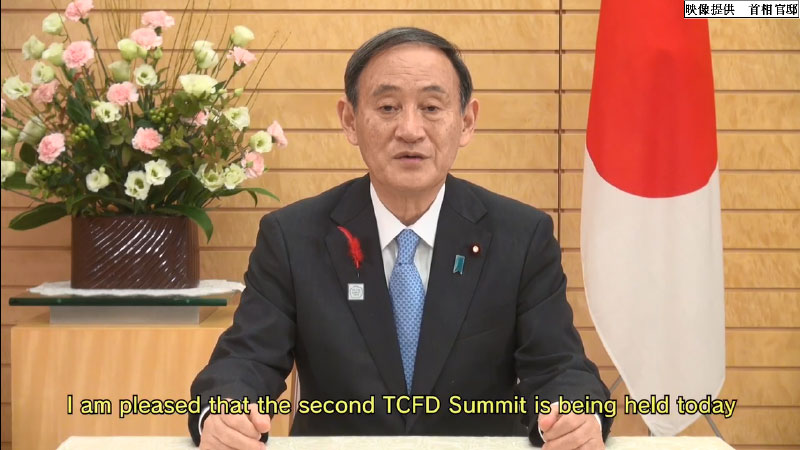
Suga Yoshihide
Prime Minister
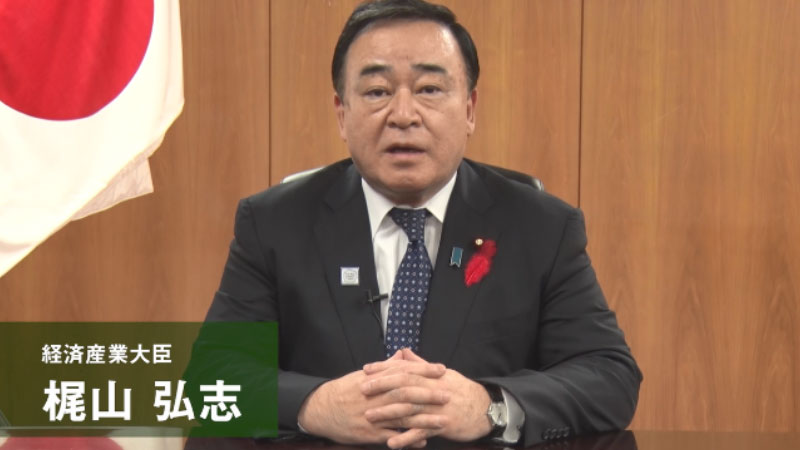
Kajiyama Hiroshi
Minister of Economy, Trade and Industry
Opening Remarks
-Message from Mr. Valdis Dombrovskis, Executive Vice-President, European Commission (EC)-
Mr. Dombrovskis stated that the TCFD recommendations are important as they provide authoritative guidance on how companies should report climate information and that the European Commission remains a firm supporter.
-Message from Mr. Mark Carney, Finance Adviser to the Prime Minister for COP26 and UN Special Envoy for Climate Action and Finance-
Mr. Carney stated his team will look for ways to make TCFD disclosure mandatory in different jurisdictions. In some countries that will be through legislation, in others it will be through securities disclosure standards, in others through accounting disclosures. He also stated that climate change should be taken into account in financial companies’ judgements as interest rates, credit risk and future cash flows are essential today. For this purpose, TCFD disclosures are regarded as the foundation of climate-related financial disclosures. He suggested that we should see how entities are managing climate related risk – where they see the opportunities, how they are governing the strategies and how they are putting them in place rather than simply making static disclosure.
-Message from Ms. Mary L. Schapiro, Head of the TCFD Secretariat -
Ms. Schapiro expressed her appreciation for the efforts by the TCFD Consortium as it plays great roles as the world’s largest body of TCFD supporters and it presents a model integrating financial and non-financial actors to work together to improve transparency. Moreover, she suggested that firms that neglect the long-term implications will not be able to compete successfully, while those looking ahead, setting net-zero emissions of carbon targets and developing products and services that support a more resilient future can thrive.
 Finance Adviser to the Prime Minister of the United Kingdom for COP26, UN Special Envoy for Climate Action and Finance
Finance Adviser to the Prime Minister of the United Kingdom for COP26, UN Special Envoy for Climate Action and Finance
 Head Of The TCFD Secretariat, Vice Chair For Global Public Policy At Bloomberg And Senior Adviser To The Founder
Head Of The TCFD Secretariat, Vice Chair For Global Public Policy At Bloomberg And Senior Adviser To The FounderOpening Session
Speakers as representatives of the co-organizers, investors and business entities delivered messages concerning changes surrounding the TCFD recommendations since the first Summit and efforts that investors and industrial organizations have been taking for implementation of the TCFD recommendations. As the momentum for climate related disclosure is further growing backed by expansion of COVID-19 and as TCFD disclosures are improving in terms of both quality and quantity, they stated their expectations for implementation of TCFD disclosures, e.g., analysis of financial impacts, and application of TCFD disclosures to innovations and transition.
Mr. Peter Bakker, WBCSD President and CEO, stated we must now focus on how climate and sustainability-related information is used in the investor-corporate relationship and create a capital market that recognizes and rewards sustainable business, attracting a lower cost of capital and more financial capital to lead the transition and transformations across critical systems.
Mr. Ito Kunio, Chair of the TCFD Consortium and Professor of the Graduate School of Business Administration, Hitotsubashi University, explained that under the cooperation framework between the public and private sectors, the TCFD Consortium, the world’s largest body consisting of supporters for the TCFD recommendations, revised the TCFD Guidance 2.0, with best practices and started a project, called GIG Supporters by investors who utilize the Green Investment Guidance for actual investment decisions and engagement. Following this, he suggested that to achieve sustainable society, we should take climate change as an opportunity to shift corporate management over the medium to the long-term period
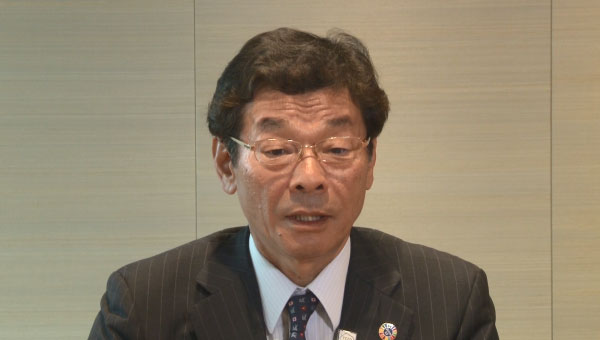 Vice Chair, Keidanren, Japan Business Federation / Representative Director, Chairman of the board, Group CEO, ENEOS Holdings, Inc.
Vice Chair, Keidanren, Japan Business Federation / Representative Director, Chairman of the board, Group CEO, ENEOS Holdings, Inc.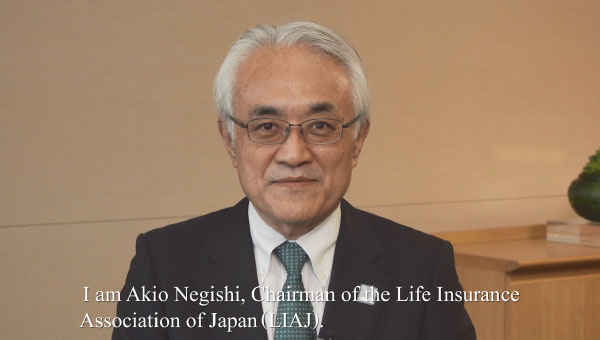 Chair, The Life Insurance Association of Japan / President, Representative Executive Officer and Group CEO, Meiji Yasuda Life Insurance Company
Chair, The Life Insurance Association of Japan / President, Representative Executive Officer and Group CEO, Meiji Yasuda Life Insurance CompanySpecial Discussion

Panelists who are representatives of business entities and investors presented their views on impacts caused by the pandemic and future directions of responses in reviewing their efforts for TCFD disclosures for the past one year. Some investors explained that companies taking into consideration ESG factors have been showing a positive correlation with their performance even in the situation of the pandemic, and also that some value chains as a whole have been engaging in net-zero emissions of CO2. Some representatives of business entities explained, against the backdrop of the quick changes seen in global-wide business environments backed by the pandemic, the need for accelerating responses, as well as the importance of investments in innovations to strike a balance between economic value and social value.
The panelists discussed that TCFD is the best framework for disclosures currently available for ESG investments as information useful for decision making on investments is necessary and that it is significant to: fill gaps with other standards through further harmonization; assess long-term risk management and business opportunities, in particular, by making use of scenario analyses; disclose information; and hold dialogues with investors. Moreover, they stated that in some cases, the sector per se should be changed. Investors should be further committed to disclosures in order to assess companies that encourage players in and outside companies to bring about innovations.
Panel Discussion 1

Climate change is an important issue for a wide variety of industries. However, in light of the characteristics of risks and opportunities varying among industries, disclosures in accordance with the TCFD recommendations should be evaluated based on the understanding of materiality unique to the respective industries, rather than check box type of evaluation. This session held discussions on: methods that companies should use for applying climate-related risks and opportunities unique to them into business strategies and effectively managing such strategies; approaches to constructive dialogues and engagement based on the materiality of each industry.
Through these discussions, panelists shared recognition that investors should consider the materiality of each industry in their investment decision from a long-term viewpoint and that companies should build a mechanism for identifying potential climate risks and opportunities and deliberating them at a management level. It was noted that disclosures are step-by-step efforts and companies do not need to make perfect disclosures from the beginning. It is considered effective for industries having the same materiality to share their sense of crisis among them, while companies should take their unique, own approaches to strategies for managing materiality.
Panel Discussion 2

A scenario analysis under the TCFD recommendations is one of the key challenges in carrying out disclosure. Conducting a scenario analysis, applying the analysis into business strategies and proceeding with them should lead to explore business opportunities. Focusing on such scenario analysis, this session shared experiences of: implementation of the TCFD recommendations by companies and assessment of companies by investors and financial institutes based on companies’ TCFD disclosures. The panel also discussed awareness from such experiences.
Through these discussions, panelists shared the importance of starting and continuing a scenario analysis and the involvement of management and related divisions. They also shared recognition that as a positive effect, a series of processes for sharing recognition with management team has a favorable influence on management, such as implementation of a scenario analysis may change the awareness of management team.
Keynote

Mr. Yamashita Ryuichi, Director-General, Industrial Science and Technology Policy and Environment Bureau, METI, introduced the "Climate Innovation Finance Strategy 2020."
Panel Discussion 3

Financing for transition, green and innovation is indispensable for global reduction of CO2. In response to the keynote speech, this session held discussions on: the importance of financing for transition and environmental innovations, and approaches that financial institutes and investors should take in assessing companies engaging in transition and innovations by making use of TCFD disclosures.
Panelists stated that companies should conduct TCFD aligned with disclosures with creativity and ingenuity, while investors proactively assess such disclosures to promote financing transition and innovation. Efforts for the Zero-Emission Challenge project are considered as one of the first step.
Panelists confirmed that Japan will secure voluntary and flexible disclosures, and regulatory foundation of disclosure has already been built with soft laws including the corporate governance code. Taking this as a starting point, Japan further encourages voluntary efforts and proceed to enhance such foundation working with industries.
Closing Remarks

Mizuno Hiromichi
Special Advisor of METI/ TCFD Summit Ambassador
Mr. Mizuno Hiromichi, Special Advisor of METI as well as TCFD Summit Ambassador, delivered closing remarks, stating some suggestions including the following.
Climate change is the primary threat to the international community but on the contrary, this can be a great opportunity. All innovations support transition to sustainable economies and these innovations need proper analyses and investments. The TCFD framework also serves as a process to fairly assess companies engaging in decarbonization. Financing for transition, green and innovations is essential for global reduction of emissions, and TCFD disclosures should include information for decision making on financing those areas. The TCFD Consortium has been advancing discussions, under the leadership of Japan, on approaches to introducing such information into the disclosure framework. Japan will strive to enrich these discussions with international support.
Although situations and economic environments in different regions and countries are things to consider in proceeding mandatory disclosure, we should not use these factors as excuses. There may be a variety of approaches to establishing such requirements other than legislation. Accordingly, governments and industry should discuss more creative approaches to this end, such as establishing substantial requirements. It is also necessary for us to consider the balance between voluntary efforts and mandatory requirements in order to respect companies taking on more aggressive disclosures under their voluntary efforts.
October 8 (tue), 2019
On-demand Video
The Digest of the TCFD Summit 2019
About TCFD Summit
- The inaugural TCFD Summit was held in Tokyo, bringing together leaders of leading global companies, financial institutions to discuss the future direction of the TCFD toward accelerating a virtuous cycle of environment and growth
- Japan released "Green Investment Guidance" as a guideline for investors to assess corporate disclosures and received wide support
- Key Takeaways from the TCFD Summit: from divestment to engagement; the importance of assessment not only of climate change risks, but also of its opportunities

Group photo of Speakers

From TCFD SUMMIT
Summary of the TCFD Summit ①
- Japan's Minister of Economy, Trade and Industry explained Japan's efforts to date for the TCFD and the importance of information disclosure. Participants also shared recognition of the importance of investment toward innovations and of measures against climate change no longer as a matter of cost but as a source of competitiveness.
- Mr. Mark Carney, Governor, the Bank of England, stated that climate disclosure must become comprehensive, and that investing in a two-degree world must go mainstream.

Mr. Mark Carney, Governor, the Bank of England
To bring climate risks and resilience into the heart of financial decision-making, climate disclosure must become comprehensive, climate risk management must be transformed, and investing for a two-degree world must go mainstream.…Now,…disclosure needs to go beyond the static to the strategic. Financial markets need information to assess which companies are resilient to climate change. To this end, companies, their banks, insurers and investors must:
1. Increasing the quantity and quality of disclosures by sharing best practices
2. Refining those disclosures to the most decision-useful metrics
3. Spreading knowledge on how to measure knowledge on strategic resilience
4. TCFD should begin to consider how asset owners could best disclose the extent to which their portfolios are positioned for the transition to net zero
→ At present of course one of the biggest hurdles to doing these is the huge variation in the measurement of ESG. Common taxonomy is to identify environmental outperformance, such as the EU's Green Taxonomy and the UN bond standard can help, but these taxonomies have tended to be binary, in other words either dark green or all brown, and mainstream sustainable investment will require a richer taxonomy, if you will, "fifty shades of green."
Summary of the TCFD Summit ②
- In opening session (Expectations for the TCFD Summit), speakers representing co-organizers (WBCSD and TCFD Consortium), TCFD secretariat, investors and business entities gave speeches that set the scene for the TCFD Summit.
- Prof. Ito, Chair of the TCFD Consortium and Professor at Hitotsubashi University, explained that the Guidance for Utilizing Climate-related Information to Promote Green Investment (Green Investment Guidance), publicized by the TCFD Consortium on the same date of the summit, focused on three areas: promoting constructive dialogue engagement; understanding and evaluating climate-related risks and opportunities; and promoting innovation and building mechanisms to facilitate appropriate fund flow. He underlined overcoming the dichotomy between environment and economy.
- Mr. Bakker, President and CEO of WBCSD, stated that while business has a critical role to play in realizing the SDGs and the Paris Agreement, it was indispensable to transform the financial system and the most important catalyst that was out there to transforming the conversation between business and capital markets was the work of the TCFD.
- Ms. Schapiro, Advisor of TCFD Secretariat, expressed her expectation that Japan would continue to take leadership in the world and the TCFD recommendations would become commonplace in financial disclosures.
 Prof. Ito Kunio, Chair of the TCFD Consortium and Professor at Hitotsubashi University
Prof. Ito Kunio, Chair of the TCFD Consortium and Professor at Hitotsubashi University Mr. Peter Bakker, President and CEO, WBCSD
Mr. Peter Bakker, President and CEO, WBCSD Ms. Mary L. Schapiro, Advisor, TCFD Secretariat
Ms. Mary L. Schapiro, Advisor, TCFD SecretariatSummary of the TCFD Summit ③
- Mr. Mizuno, PRI Board member / Executive Managing Director and CIO, GPIF stated that GPIF published the reporting in line with the TCFD recommendations in its ESG report this August, and that when portfolio of GPIF which is universal owner would become aligned with the two degrees, then the world would become aligned with the two degrees scenario.
- Mr. Shindo, Representative Director and Chairman, Nippon Steel Corporation / Vice Chair of Keidanren, said that the Japan Iron and Steel Federation had promoted initiatives such as formulation of a long-term vision for the industry "A Challenge towards Zero-carbon Steel" last November. He stated that in order to realize the virtual cycle of the environment and economic growth, the assessment of opportunities needed to be further focused and investment should be driven not by divestment ideas, but by technological development towards a future society.
- Mr. Holliday, Chairman of Shell stressed that it should not scare us to have an energy transition and we're in that period now where we're seeing those opportunities. He said that even though Shell had been doing scenario planning for 48 years, to achieve this, it set a goal for 2035 and 2050 of their carbon reductions and tied a three-year goal on carbon to our executives' compensation.
- Video message from Vice-President Dombrovskis, EC, said that public money won't be enough for achieving the Paris Agreement goals so that EC presented sustainable finance action plan like taxonomy to mobilize private finance toward sustainable growth. He also extended Japan a welcome to its leadership on climate-related disclosures and its work towards a public-private initiative including "Green Investment Guidance" to scale up green investment.
 Mr. Mizuno Hiromichi, PRI Board member / Executive Managing Director and CIO, GPIF
Mr. Mizuno Hiromichi, PRI Board member / Executive Managing Director and CIO, GPIF Mr. Shindo Kosei, Representative Director and Chairman, Nippon Steel Corporation / Vice Chair, Keidanren
Mr. Shindo Kosei, Representative Director and Chairman, Nippon Steel Corporation / Vice Chair, Keidanren Mr. Charles O. Holliday, Chairman, Royal Dutch Shell Plc
Mr. Charles O. Holliday, Chairman, Royal Dutch Shell Plc Video message from Mr. Valdis Dombrovskis, Vice President, European Commission (EC)
Video message from Mr. Valdis Dombrovskis, Vice President, European Commission (EC)Summary of the TCFD Summit ④
- In panel 1 (From Divestment to Engagement), panelists shared their recognition that divestment only shifts the emissions; it does not eliminate them so that it is important to encourage companies to change themselves through engagement; the Green Investment Guidance (GIG) will be a useful tool in facilitating dialogues between corporates and investors.

A scene from Panel discussion 1
 Ms. Helle Kristoffersen Ms. Helle KristoffersenTotal |
|
|---|---|
 Mr. Gordon J. Fyfe Mr. Gordon J. FyfeBCI |
|
 Mr. Yu Ben Meng Mr. Yu Ben MengCalPERS |
|
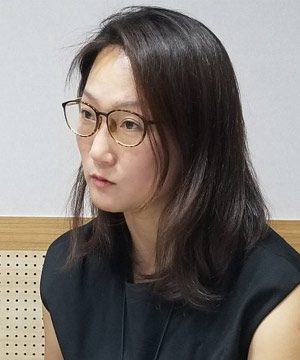 Ms. Yoo-Kyung Park Ms. Yoo-Kyung ParkAPG AM |
|
 Mr. Martin Skancke Mr. Martin SkanckePRI |
|
 Mr. Mark Lewis Mr. Mark LewisBNP PARIBAS AM |
|
Summary of the TCFD Summit ⑤
- In panel 2(How to Develop Opportunity Assessment?), panelists from companies introduced positive feedback on disclosing climate-related corporate information. While ESG indexes companies/asset managers said that they're developing metrics and framework for assessing opportunities, but there's still a lack of data, particularly on small and midcap, SASB pointed out that there's a problem with not a lack of data, but a problem with the quality of data as well as inconsistency of data, which requires different models of raters to be consistent.
- In panel 3(Disclosure in Asia: Challenges and Opportunities), panelists discussed the challenges in promoting disclosure in line with the TCFD recommendations in Asia where rapid growth and huge demand of green investments are envisaged. There were remarks: in Asia making up of highly emitting sectors, how do we encourage these companies to report more while we deal with growth, access to energy and a just transition; more practical way of assisting the business corporation and financial institution could be developing certain transition taxonomy type of instrument.

A scene from Panel discussion 2

A scene from Panel discussion 3
Summary of the TCFD Summit ⑥
- In closing remark, Mr. Bakker, President and CEO, WBCSD, co-organizer of the summit, stated the following message as key takeaways of the summit.

Mr. Peter Bakker, President and CEO, WBCSD
Abstract of key takeaways from the TCFD summit
- In order to accelerate a virtuous cycle of environment and growth, we need constructive mechanisms that can improve corporate value and generate a positive flow of finance with increased returns on investments. The "Green Investment Guidance" released today by the TCFD Consortium will be a useful tool in facilitating these dialogues between corporates and investors.
- We need to progress the transition to a more sustainable finance system by having a clear understanding of the risks of climate change and how to price them, but also of the opportunities that the transition to a net-zero society offers business as a channel for innovation.
- We have heard that in order to accelerate the realization of a virtuous cycle of environment and growth, divestment as a strategy has its limitations; rather constructive engagement is a more powerful tool to generate a more a positive flow of finance towards an energy transition.
- In Asia, where rapid growth, infrastructure investments and increasing demand for green investments are envisaged, it is essential to promote climate-related disclosures in line with the TCFD implementations. It is important that we adopt a pragmatic approach in this region to support a smooth transition towards a low-carbon society, which supports Asia's continued economic development. Equally, it will be important to showcase the suite of low carbon technologies that have the potential to contribute to the transition in the region, with the understanding that these solutions may represent "50 shades of green".
- We have also heard clear calls for continued efforts to bring together a wide range of stakeholders, including global industry, the financial community, the public sector, regulators and international institutions to support the TCFD and focus the work towards the implementation of its recommendations. This will be a key catalyst in sparking the virtuous cycle of environment and growth on a global scale.
- Therefore it is our intention to convene this summit again in Tokyo next year and we look forward to the opportunity to hear more about the progress the TCFD community is making. In the meantime, we can rely on the Japan's TCFD Consortium to continue to support our efforts through its commitment to collect and disseminate best practice from around the world, including Asia.
- Finally I would also like to add that it is also abundantly clear from today's discussion that the TCFD is playing a critical role with regard to guiding our transition to a low carbon economy. It is therefore of the utmost importance that the work of the TCFD should continue and that it should go on providing a platform and an impetus for these of vital discussions and learning opportunities.
- For details, see the Key Takeaways from the METI's link below (https://www.meti.go.jp/english/press/2019/pdf/1010_004a.pdf)
- The title of speakers in this page is as of Oct 8th, 2019, when TCFD Summit was held.



